#berserk meta
Text
femto and child griffith
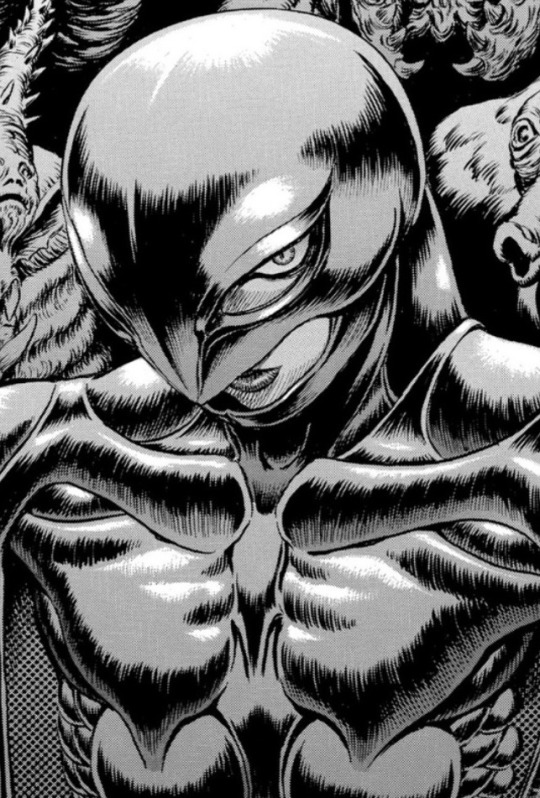
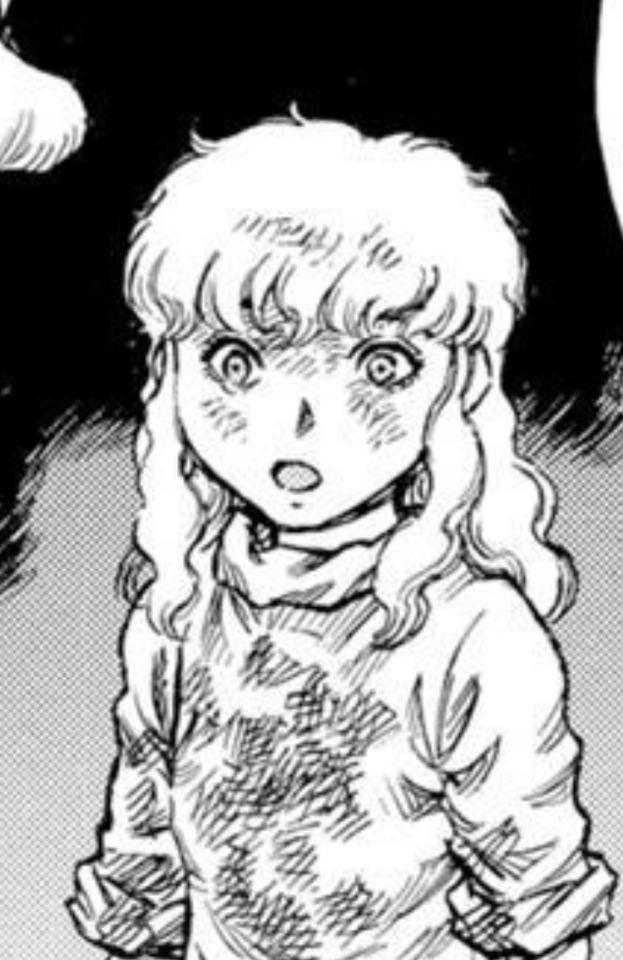
more 3am thoughts when i have an exam tomorrow morning (inspired after seeing this gorgeous art btw): while i've seen my fair share of posts about femto and griffith, i haven't seen one about femto and child griffith specifically, and i'm also in a word vomit mood, so here goes.
imo femto, and neogriffith by extension, can be considered both the precise antithesis of and the fragile armor around that guilt-stricken, tottering child version of griffith that we see in the eclipse sequence. child griffith in the eclipse sequence is a representation of what made griffith human; not the untouchable, invulnerable, superhuman ideal that griffith projected for others, the ideal that made guts feel inadequate next to him. child griffith is griffith's guilt, his passion, his love, his affection, his sense of responsibility, his self-loathing, his fear, his insecurity.
femto has had all of these things excised by the sacrifice. he's the manifestation of the callous, cruel monster that griffith always feared he was, and the opposite in every way of what that child griffith stands for. but at the same time, femto only exists because that child griffith does. griffith only became femto because he had so much guilt and love and self-hatred and fear, and it eventually overwhelmed him. he only made the sacrifice because he couldn't bear those feelings, because he wanted so desperately to get away from them. in making the sacrifice and becoming femto, griffith put up an armor around his child self. he protects that guilt-stricken, tottering child from having to grapple any longer with the weight of his remorse and insecurity and pain, because, at his lowest point, it truly became too much for him to endure. femto may be the opposite of what child griffith stands for, but at the same time, femto could never exist without child griffith; he was born to shield him. he is both an anguished denial of and an enclosed, faraway sanctuary for that sobbing child staring at the castle in the sky, a dead boy in his arms and a mountain of corpses piled beneath his feet.
i think that fits really neatly into an overall theme of berserk too: that humans have different sides, and those different sides are not supposed to be wholly separate from each other. berserk likes to play with and defy dichotomies, and you're not supposed to think of griffith as separated down the middle into two: his "human" side and his "villainous" side. they exist together. his "villainous" side simultaneously rejects, protects, and is fueled by his "human" side. you can't have one without the other.
#whew i got pretentious here#something about test anxiety brings it out ig#berserk meta#berserk tag#i ramble#griffith#berserk griffith#griffith berserk#femto#berserk femto#femto berserk#berserk#berserk manga#kentaro miura
108 notes
·
View notes
Text
was the wagon scene in berserk sexual assault?

i mean whatever lol. im ngl in some ways this feels like making a whole ass meta post about whether or not "casca enjoyed it." like do i even need to take this perspective seriously? yeah, yeah, i know, that's a pretty inflammatory thing to say, and a lot of the people who i've seen say the scene is NOT assault don't deserve to be belittled like that.
i think it's possible, and very interesting, to discuss the nuances of the scene. what was griffith's intention in that moment? why didn't casca bring up what happened to guts when he asked? how does this contradict or supplement what we already know about their characters?
per usual, though, most of the discussion of the scene itself put very little thought into one of the TWO main participants - casca. so let's do that, i guess, and look at the scene on the whole.
CW, i will show one eclipse panel (the kiss) in this meta, but that's is
what happens before?
the scene in the wagon comes immediately after the band of the hawk's encounter with wylad. wylad has thoroughly humiliated griffith in front of the entire band of the hawk, told them that griffith is totally defeated and broken, and tried to rape casca while griffith struggled uselessly, unable to help at all.
the band is regrouping afterward, and the reality of griffith's situation is sinking in to the members of the band. we don't know for sure if griffith can hear this, but the band is even discussing whether it makes sense for casca to permanently become the band's leader. where would that leave griffith? a burden, helpless, unable to even lead his own men.
griffith can, however, overhear casca talking to guts just a moment later. she says guts isn't reliant on griffith's dream, and griffith through the wagon can easily see their closeness.
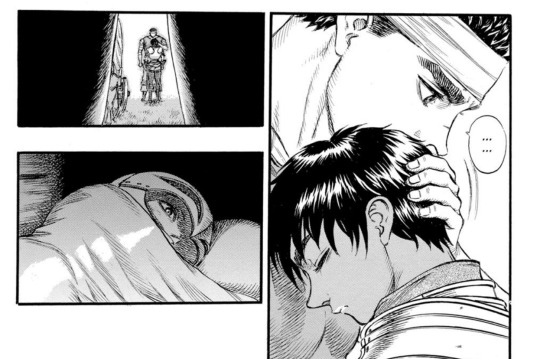
at this point, casca goes to griffith in the wagon.
so where is griffith? his men, who despite his capture have been sustained by his dream, are losing their faith in him because wylad showed how utterly powerless he is. meanwhile, guts is touching casca in an intimate, close way. he feels like everything is slipping through his fingers, even his particular place of importance for guts. he's lost guts to casca. i would argue this piece, seeing casca intimate with guts, changes his mindset even compared to where he was during the scene with wylad.
where is casca? she's still clinging to that hopeless dream. she was so lonely as the commander of the band of the hawk, trying to face the reality of griffith's injuries and the overwhelming way that their roles have been reversed. she's leaning on guts, on anyone, for support for the first time, while being forced to put on a brave face not just for the whole band of the hawk, but for her idol and savior.
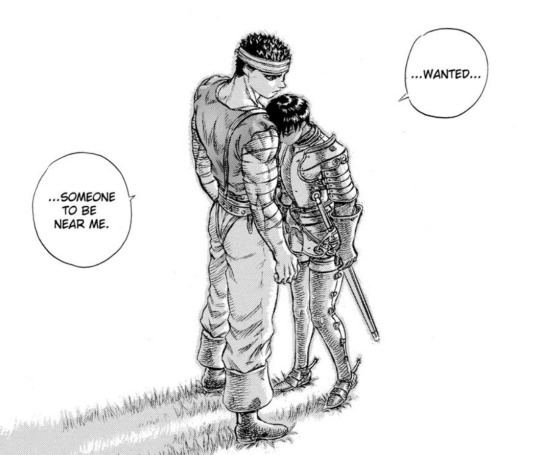
what happens during the scene?
casca is changing griffith's bandages. she knocks over a bowl of water, and when she goes to leave the wagon to replace it, griffith grabs her, and... well, that's kind of the whole crux of this meta, isn't it?
griffith forces himself on top of her. the question is why, and what's his intention? that's been discussed a lot on tumblr. the other question is: what does casca think his intention is, and how does she take it?
there is a lot of visual language in the scene that, to me, clearly indicates sexual intentions from griffith, and clearly indicates that's how casca takes his intentions.


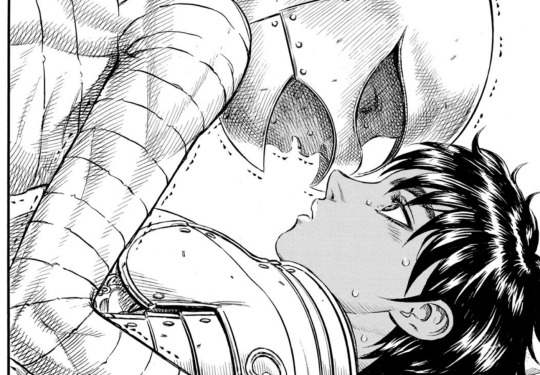
side note, i think griffith is crying in the above panel. could be sweat, could be tears... it's subtle enough to leave it up to interpretation.
that last panel in particular is EXACTLY paralleled with the kiss panel during the eclipse. the helmet, the direct eye contact, the pose... miura has always been very intentional with his parallels and his paneling, so i doubt this was an accident. the eclipse panel is just below, btw. scroll quick if u dont wanna see
.
.
.
.
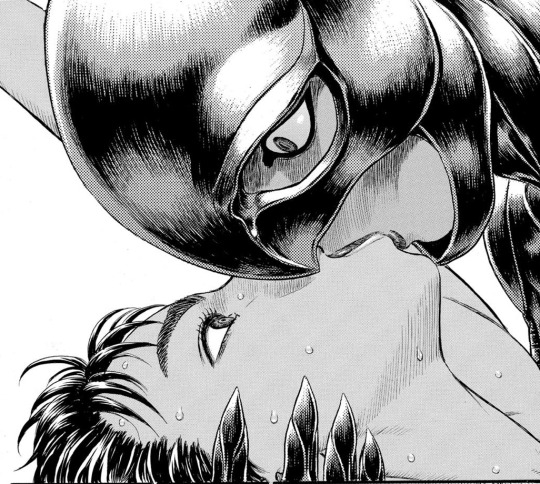
.
.
.
.
.
.
this is also how griffith and charlotte's sex scene started.
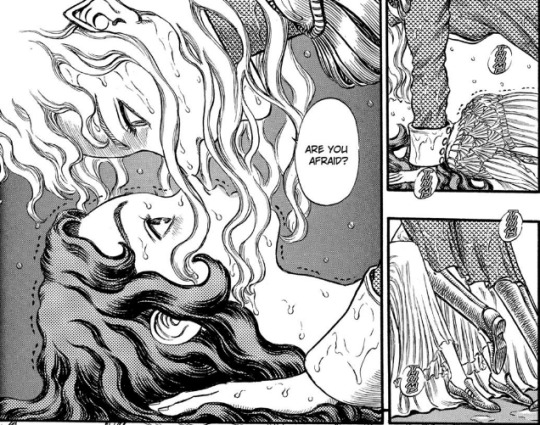
the wagon scene and the sex scene with charlotte happen because griffith is doing something rash purely on emotion after feeling stripped of all power and no longer in control of a situation. it's not as simple as griffith being an evil rapist from the start, but you can easily see a pattern of him lashing out and trying to regain control through pushy/coercive sex with women. would griffith do this kind of thing normally? no, of course not. but nothing about the situations he's at these points in the manga are "normal," and again there is a pattern of him lashing out and using women as an outlet for his feeling out of control. they ALSO both happen because he feels like he's losing guts.
casca tells griffith to stop, and griffith does stop, but it's not clear to me if he stops intentionally, or if he simply is physically incapable of continuing. i've seen the idea put forward that griffith is terrified that guts and casca are going to abandon him, and so he offers his body as the only thing he has left in a fit of desperation. i'm not opposed to that being part of it - griffith has used his body and sex as an offering before, with gennon.
this is how griffith is looking at casca during the scene:
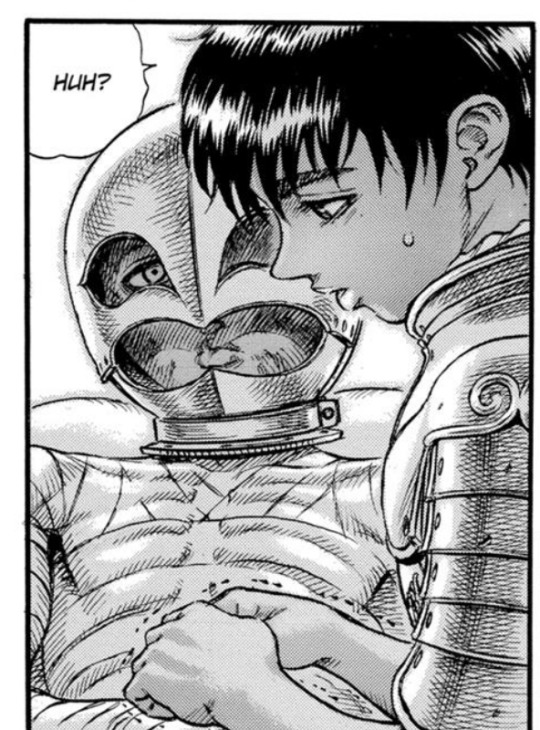
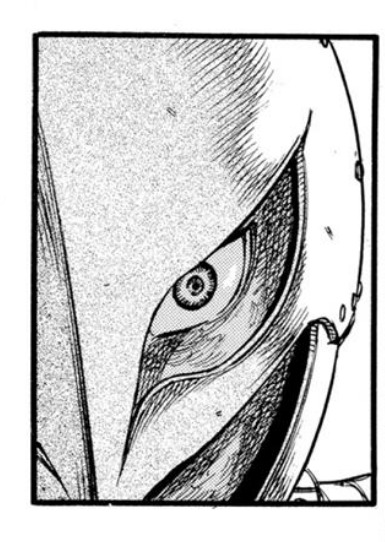
one is normal and even wistful and sad, the other is...... fucking batshit LOL put those damn things away!!!! blue eyes white demon
one thing, though, that i want to say very clearly: griffith may have offered himself sexually to casca out of desperation, but it is very clear to me that casca did not want it. griffith fully forced himself on top of her, too, with his arms wrapped around her. if it was unwanted and forced sexual contact, regardless of why griffith did it or how much of a woobie he is to u, that is BY DEFINITION sexual assault.
this is the part that kind of drives me crazy. i don't personally believe that this was an act of self-loathing or self harm, like take my body because i have nothing left, but even if it is - it is still sexual assault. it is!!!! this isn't an argument!!!!!! yeah he was sad about it but it was still sexual assault!!!!
but anyways, enough about griffith. how does casca react?

i've seen the fact that she doesn't push him off presented as evidence that this wasn't assault. i'll... get to that.
what happens after?
after, we get these panels of casca, obviously shaken, outside the wagon.

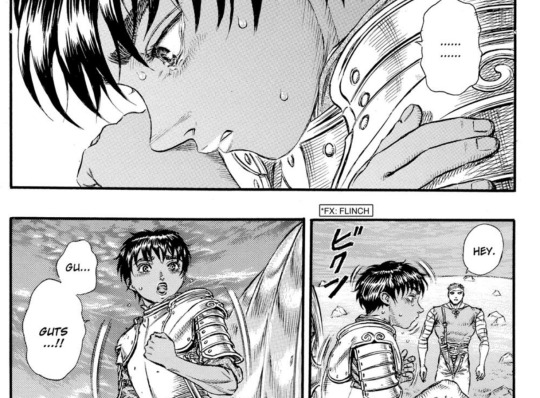

she is clearly VERY upset. when guts approaches, he sees something is clearly wrong, but she brushes it off and says its nothing. when he keeps pressing, asking if it was something with griffith, she eventually breaks down and tells him that she can't leave with him. she has to stay with griffith, she has to care for him in his fragile, broken state. guts, on the other hand, has to go. even if its alone...

is this reaction in conflict with the idea that what griffith did in the wagon was sexual assault???? no. not at all.
casca feels immense devotion to the band of the hawks, and especially to griffith. she reminisces about how strong griffith seemed to her while she bandages him in the wagon. he gave her everything - a purpose, a reason to fight, a dream, and now even though the event was terrifying she sees griffith's physical weakness and knows she can't leave him. she can't leave him. how often irl do women overlook instances where their boundaries were violated, or a man they're close with was sexually aggressive towards them, because of those pre-established relationships? because that's their boss, or manager, or idol?
and not telling guts - honestly, that to me oddly is evidence to prove it WAS sexual assault. i think casca's single-minded devotion to the hawks and their dream would have made it so that she wouldn't dare bring up griffith doing anything to make her uncomfortable, because everyone is already on the brink of falling apart. even before this, we see her putting everyone above herself to keep the hawks together - crying alone when she thinks no one can hear her, barely sleeping, so exhausted she becomes suicidal, there is no reason to believe she would bring up something that just upset HER. she is less important, in her own mind, than the good of the whole. it makes perfect sense that she would do exactly what she does - she cries alone by the side of the wagon and doesn't tell anyone what happened.
another thing that i want to be very clear about: the idea that because casca didn't immediately push griffith off of her, and because she didn't bring it up to guts, and because she decided to stay with him afterwards, that means it certainly can't be sexual assault? that is rape apologism. full stop. if your argument hinges on any of those things, your argument is rape apologism. this is not up for debate.
NOW - did kentaro miura in the 1990s in japan know about the nuances of how women react to sexual harassment and sexual assault? that i'm not sure about lol. the argument "this is not in line with the way i assume cishet man kentaro miura in 1996 would understand sexual assault, and therefore i don't think it was his intention to depict sexual assault" is something i can understand. that's NOT what i'm seeing though.
that being said, there is some evidence that miura DID have a very nuanced understanding of assault. here, we have griffith talking almost to himself (though casca is nearby), breaking down about how dirty he feels for sleeping with gennon.
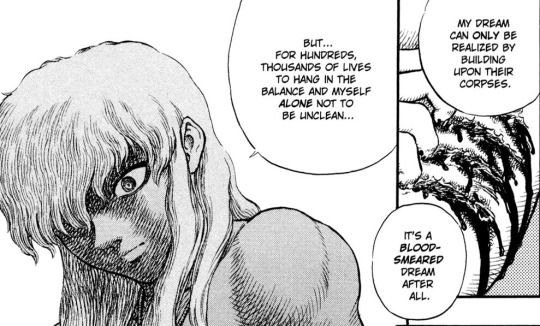
and yet, when casca embraces him, trying to comfort him, what does he do?

HMMMMMMMMMMMMMMMMMMMMMMMM
and yeah, guts kills gambino, but only because gambino tries to kill him. guts first reacts by crying and asking why?
finally, compare the above panels of casca after the wagon scene to casca after almost being raped by wylad, and after the eclipse:
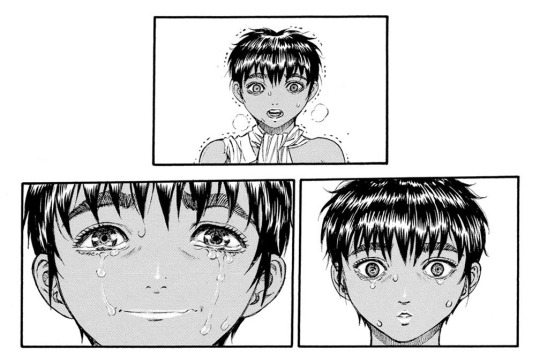
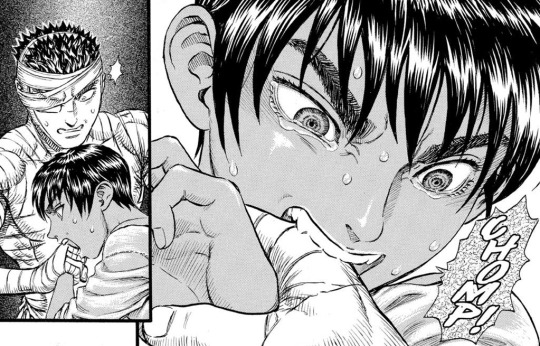

i mean, this is how miura draws casca when she's fucking going through it generally, but STILL. they are similar. she's shaking while bandaging him because he's so weak, but afterwards she is unable to mask how shaken she is. i don't think her reaction is JUST because he's weak.
this is so fucking long LOLLLLLL. i'm not interested in arguing with any of the various meta posts about the wagon scene not being sexual assault directly, or discussing it with the authors. if you want an alternate perspective, one that takes into account more of casca's POV, this is for you, and i hope you found this helpful! finally i've got this all in one place
tl;dr i think due to the framing you're supposed to see griffith's intention as sexual during the scene, casca very clearly doesn't want it, if your argument that it's not sexual assault hinges on her not pushing him off immediately u suck
uhhhhh that's it
126 notes
·
View notes
Text
One Perfect Moment




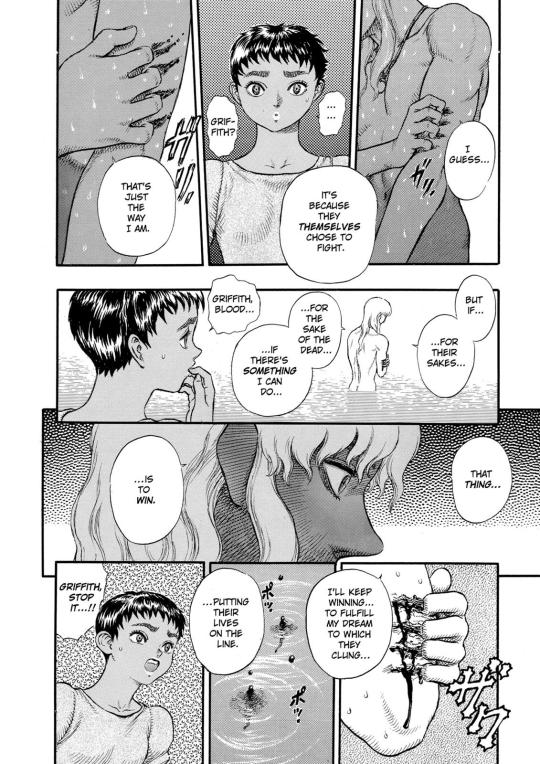

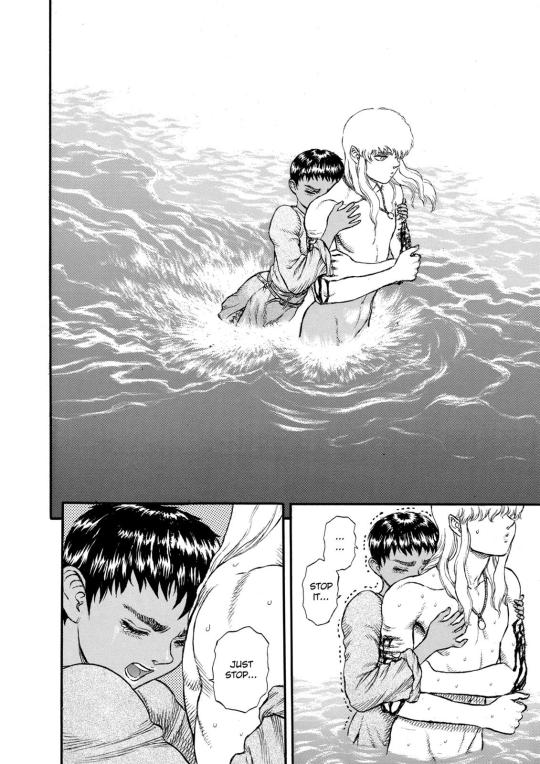
Griffith is quite possibly the greatest villain of all time, and also the most misunderstood.
This is not to say he's done nothing wrong. He's done Everything wrong. He's done it so wrong that the wrongness is visible from space, and he did much of the Wrong well before he joined the God Hand. But somehow the common fandom view has become that he's a cold calculating monster well before the Eclipse, who doesn't care who or what he sacrifices in pursuit of his dream.
In actuality, everything the man does is driven by his emotions and especially his affection. He loves Guts too much to let him leave without a fight, he can't handle his sorrow on his own so he goes to Princess Charlotte, and when he's caught with the princess he can't get away because his sword is broken from the stupid impulsive fight he had rather than just telling Guts his feelings. Even the suicide attempt that started the Eclipse was a result of him having an emotional breakdown from overhearing Guts and Casca.
But this? This right here, when we see Griffith tearing his skin off in shame and self-loathing after he prostituted himself to a child predator because he personally felt responsible for a little boy's death? This is everything.

All you need to know to figure out what will happen to Griffith and the Band of the Hawk is this scene. It neatly lays out everything to come.
There is no war without death. There is no throne without blood spilled. And that may be logical, but contrary to popular interpretation, Griffith only acts like he's driven by logic. He's not. He's debased himself to the point that self-mutilation is the only way he can stand his own skin, all for the purpose of staving off the inevitable as long as possible.
And then he reaches a point where he's literally unable to debase himself further.
After losing the ability to walk, to hold anything, to speak, after losing skin and half his face and having his body violated in every imaginable way, including the most obvious ("like we were husband and wife"), there's nothing left for him give of himself, and his dream is still out of reach.
and then a bunch of demons show up when the man is out of his mind from a year of torture and isolation, and tell him he's a spoiled child playing with his friends' corpses and their suffering is for nothing if he doesn't kill everyone else and take the throne:

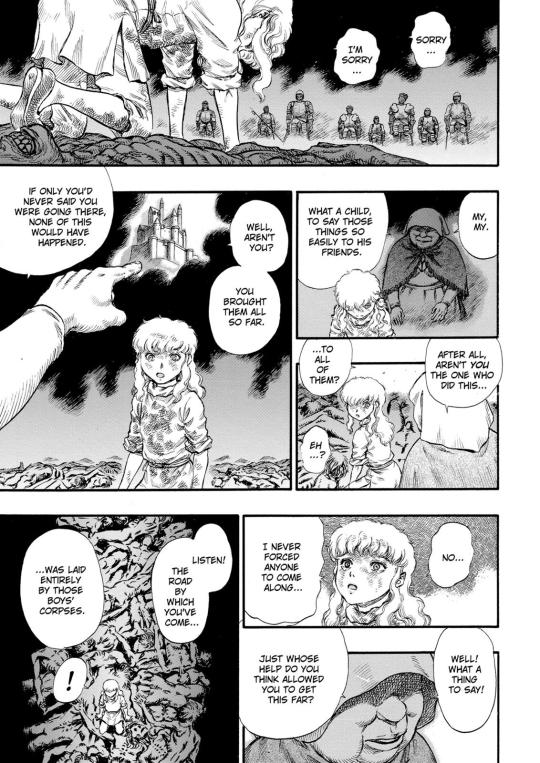
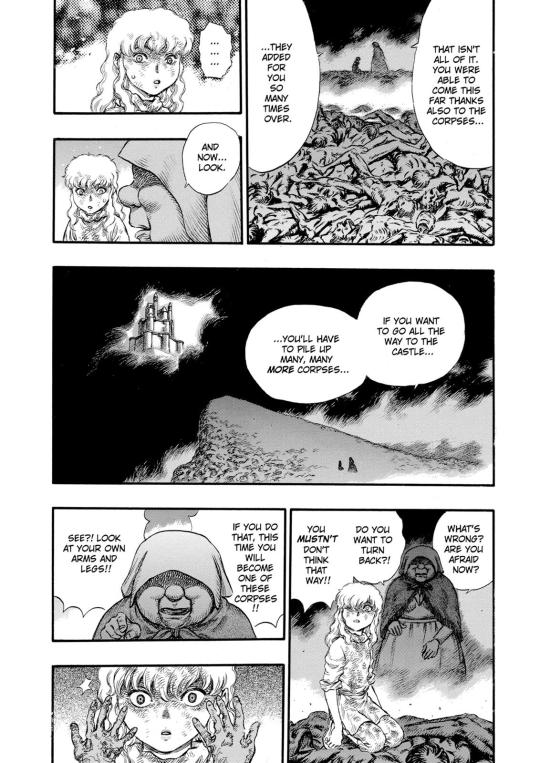
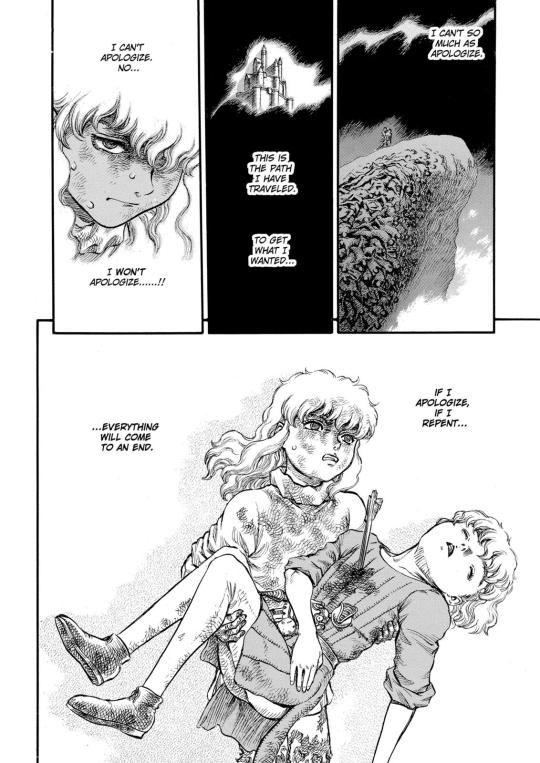

[Shredding his skin]: "I have neither regret nor remorse about that."
[Sacrificing everyone]: "I can't apologize. No, I won't apologize!"
if it helps you sleep at night, Griffith
They're both acts motivated by guilt from the pain he caused those who placed their faith in him, and the second one wouldn't hit so hard if not for the first. It's SO good and yes, he's a bastard, but he's not the heartless conniving bastard he's painted to be.
Perfect moment, no notes.
[as an aside I just realized when getting these images that directly before the Eclipse begins Griffith is mentally begging Guts not to touch him because he can't make stupid self-destructive choices when Guts is there and then he doesn't make the decision to join the God Hand until he can't hold onto Guts so they aren't touching anymore, amazing work]
#si cw#blood cw#side note I pretty much lost all interest after this sequence#because then the thing with Femto and Casca happens and why#why is it drawn like that#why did it need to exist#Griffith#I love him as I love all white haired anime boys#Berserk meta
197 notes
·
View notes
Text
So, what is Berserk about after all?
Please be considerate to me, don’t repost this, don’t share it outside of tumblr, don’t copy parts of it, thank you.
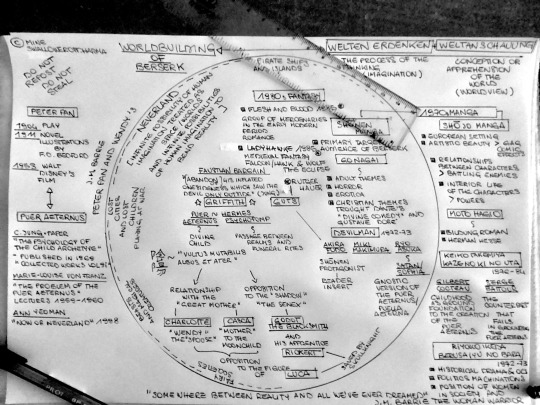
I have read really funny critiques and reviews of Berserk. Often they would refer to Miura supposedly saying that he didn’t plan everything out and they would use this statement to support their argument that after the Golden Age arc the story just looked like it dragged on. One, don’t ever fully believe what artists and writers say about their work. Second, without a proper conclusion it is impossible to make that kind of judgement and the story is ongoing. Then, not having a plan or having just vague ideas and taking inspiration here and there isn’t how manga works or how it gets published. When asked in an interview why he started creating Haibane Renmei as a doujinshi, Yoshitoshi Abe replied: “With mainstream publishing, it would've been difficult to do it with that avenue because of this particular approach with everything being adlibbed. I don't know how the story will be developed, how it's going to end up, or what the ending's going to be. If you go to a mainstream publisher, by their general approach, they have to know what the characters are, who they are, what the story's going to be, and how the story's going to develop so they know if there's going to be a serial, continuing storyline. They need to know how it's going to go”. Even though plans can be renewed and renegotiated, Miura still needed to make solid advanced plans and decisions and respect deadlines and page quotas. Even without considering this, the world building of Berserk seems too intentional and coherent to me to think that he didn’t really know how the story would go. Granted he created a reality that could be changed and bent by the human imagination and psyche, from the inside. This happened to be a brilliant choice for a long project like the Berserk manga.
I once read a review that pointed out the weakness of the later arcs and episodes, making the hypothesis that Miura was influenced by the success of stories like One Piece and Pirates of the Caribbean. I can’t really say that I share this opinion, either. Reviews like these make me smile, because they reveal how people missed a very big clue that Miura never really hid. Berserk was inspired by the story of Peter Pan as told by J.M. Barrie and reinterpreted in several different ways, not only visually. He went as far as dedicating to it the Lost Children chapters, immediately after the Eclipse, when the tension of the story was higher than it ever had been. We should read the Lost Children as an homage to the story of Peter Pan and Wendy that plays into the already disquieting themes of the original in darker tones and with much more horrifying elements; but we should also pay great attention to the Lost Children chapters as an important recontextualization of the events of the Golden Age arc. While I want to dedicate proper analysis and attention to this, I am going to add here that in Peter Pan we already had the pirates, the islands with hidden caves and the mermaids. The journey to Skellig island and Elfhelm had to be long enough for Moonlight Boy to make an appearance at least twice before the big reveal of his full identity the third time, and since he can only appear on nights of a full moon, Miura had to make the readers feel that time had passed. But Guts had always belonged in Neverland.
In my rudimentary outline of various elements that contributed greatly in building the world and story of Berserk, I actually ran out of space. And I want to properly address the various points and develop them more. For the moment I just really wanted to show that Miura had a very strong grip over the story and that he was really attentive to nuances. I said to myself, if I want to criticize the writing in Berserk at least I have to make sure I understand it to a sufficient extent.
Also I really wanted to at least give an idea of how important a role Shōjo manga had to Berserk. I hope to be able to fully explore this element soon.
#berserk#berserk meta#kentaro miura#manga analysis#guts berserk#griffith#casca#all the tags because I worked hard on that outline lol#another little bit of groundwork to give context#lost in translation#berserk themes#berserk as a Shōjo manga#eri reads berserk
26 notes
·
View notes
Text
Rambles About the Golden Age Arc Addendum: The Lost Chapter
This is what I was going to post two weeks ago but I ended up rushing the Hill of Swords for Vday instead. So here we go!
I meant to do this months ago, but I’m lazy—uh I mean I didn’t For Some Reason. But after reading about Miura’s thoughts on the Lost Chapter I decided look at it again and, well, the pages were out of order on all the sites. So I tried to track down the correct order and ended up reading about it and blah blah anyway whatever who cares here we go.
Rambles About the Golden Age Arc Addendum – The Lost Chapter

So for those who don’t know (not a lot of people, but hey there may be newbies), the Lost Chapter is the original Berserk Chapter 83, God of the Abyss Part II. It follows directly from the pages where Griffith’s soul or astral form or whatever departs the physical plane and goes forth to become Femto. So okay here’s some of the leadin for context:

Griffith’s spirit departs the physical plane by traveling through a water-like abyss (which is very reminiscent of what’s going on with Guts in the current chapters, I might note). This is actually especially interesting because later in the series Schierke remarks that the ocean supposedly leads to the astral plane - the actual ocean, that is. This one I assume is more of a metaphorical/spiritual ocean.

Anyway, there, he is confronted by the reality of the Sacrifice he chose, and is shocked at the horror of it. This is kind of a sidenote but there is some question as to exactly what he thought would happen when he took that deal, because he doesn’t appear to have known it would be that.
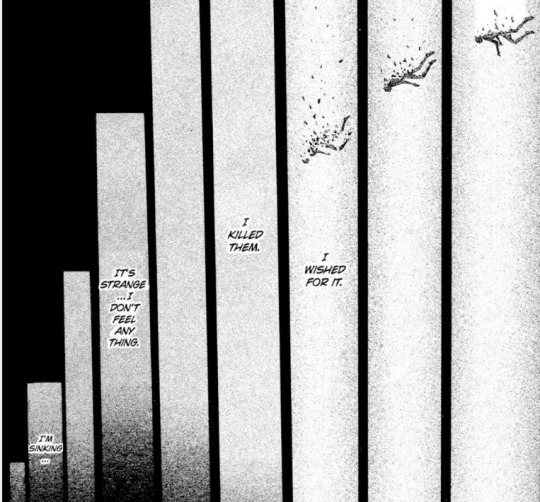
He’s also surprised that he doesn’t feel anything about it. At this point, as Griffith’s last tear falls, an off-panel voice chimes in to explain his lack of emotional response....

“When suffering so profound as to make someone rip himself apart is confronted, a heart is frozen.”
I think I said this way back in Golden Age Rambles 16, but this is one of my favorite (and imo one of the most important) lines as far as Griffith’s character is concerned. Because it suggests that his emotional suppression is at least in part a trauma response - it also confirms that this emotional deadening, which is a result of the trauma response/his confrontation of his suffering, is the reason he doesn’t feel anything - as opposed to it being, for example, because he’s a sociopath. Sigh.

We are given an explanation for the existence of behelits, which Miura later clarified in interviews as being solidified souls whose faces are skewed due to their fragmentation and lack of ... being a person as yet. Love that for them.
Finally, Griiffith encounters...

A pile of flesh that he refers to as God.
And that’s where we transition into the Lost Chapter.
So originally the chapter I am about to discuss was the chapter after this, but when the chapters were collected, Miura had it removed. There’s been some discussion as to why that was, but officially his explanation was that it gave away too much too early and that something as extreme as an on-panel appearance by God should be saved for the end of the series. He also said that he didn’t like to nail down the limits of the world and wanted to keep things flexible in case he needed to change something.
From there, a lot of discussion has been had about whether the story “counts” or not. My position is basically that it’s fairly safe to assume that this or something like this happened during Griffith’s ascension, because it seems like the main reason he didn’t include it was more because it was too revealing than because he changed his mind. And while he did want to have the option of changing his mind, ultimately nothing he did ever contradicted it, and there were references and minor cameos that seem to confirm it.
So I personally consider it to be pseudo-canon, like broadstrokes canon, but with the understanding that details may be inaccurate. Nonetheless, I also consider it an extremely interesting and informative chapter when one wants to try and unlock the secrets of what the series is trying to say.
So here we go. I’m putting the entire chapter up. The pages are presented in their correct order – most websites post some of the pages out of sequence. It doesn’t really make a huge difference to the meaning, but it does change the flow a little bit. The order that follows is confirmed based on raw scans.


Okay so this is pretty basic – Griffith recognizes this as probably God, and its confirmed. One nitpick I do have is um, literally the NAME “Idea of Evil.”
Normal disclaimers apply - I’m not fluent, correct me if wrong, etc etc I proceed in good faith.
So this is a little weird because it’s another case of the Kanji saying one thing and the furigana saying something else. The name is given as 魔の源形 - something like “the form of the source of malevolence.” with furigana over 源形 being the katakana for “idea.” So what it’s actually saying is Ma no Idea - fairly translated as Idea of Evil, but what it means is that it is the physical form of the source of malevolence/evil/etc.
...I mean it basically means the same thing, but I think for me when I see 魔の源形 I think of something like the Endless from the Sandman, which follows from some of the later dialogue, because as much as people assume that having “ma” in its name means it is, itself, malevolent it’s more like the spinner of malevolence, which brings me back to the Sandman, because while Dream embodies dreams, he isn’t, himself, a dream. He’s the thing that makes dreams, see what I mean? Well I’ll probably get more into it later.
In the meantime, Idea of Evil is fine but it does seem to be a descriptor rather than a name, and I do find the longer and more awkward translation a bit more useful in understanding what this deity is.
Moving on!

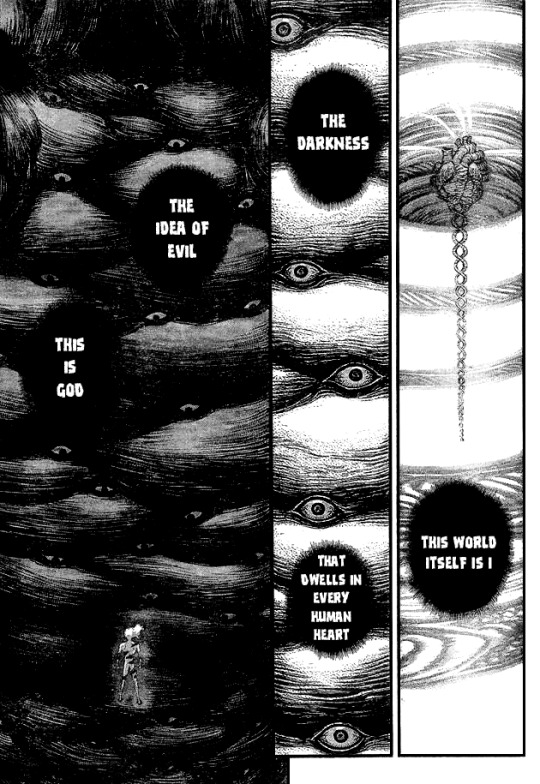
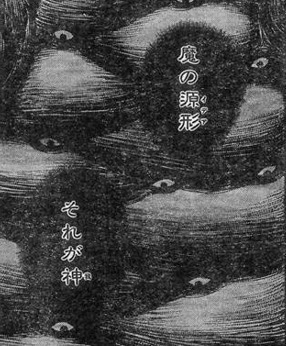
It’s saying “that” is God not “this” is god which I guess sounds nitpicky but for me if it says “this” it’s more up close - I’m the idea of evil, i am god! vibes. Whereas “that,” to me, feels more of a neutral, “the source of evil is god/" kind of vibe.
It’s kind of like the flame/making mistake thing I went on about with Guts before, like it doesn’t change the fact that he’s talking about Casca, but it changes what the fact that he’s talking about Casca means.

One of the interesting things from the twitter festival of Miura quotes was this thing about how the faces that overrun the landscape during the eclipse represent that this is the collective will of humanity. And I’m bringing this up because its the same faces that are visible in the ocean of souls. Its also a similar face to what comes out when the behelit rights itself. So that all tracks.
The most important thing here, though, is this concept of the common consciousness beyond individuality - humanity’s collective consciousness or, as Griffith eventually says, “where they will become one.”
It’s this collective will that is really the most powerful force in Berserk - even IoE serves this will, and it is this will that seemingly reshapes and controls the nature of reality - like splitting the astral from the physical worlds when humans lost their faith in supernatural things.

So I talked about this before, but one thing that I notice people tripping over a lot with the whole “Griffith is the desired savior” thing is that people have a hard time I guess divorcing themselves from assumptions that are rooted in the real world, whereas Miura specifically and explicitly rejected those assumptions within the framework of Berserk’s world.
What I mean is, when people see Griffith – who is a demon with some nasty crimes to his name – presented as humanity’s chosen savior they assume this must be a farce, right? Because how could someone like that be humanity’s chosen one, it must be a big act and hes actually just the fake savior and someone else is the real savior.
The problem with this is that Humanity’s will within Berserk is extremely ambiguous of intent right, like it’ll get into this later, but the great desire of humanity was not to be protected or saved from harm, it was to have reasons for the harm they experience and thus their will gave birth to a God who did not stop their suffering but rather provided a purpose behind their suffering. Similarly when Griffith restores the world to the shape desired by humanity, that world is exponentially more dangerous than the world before his return.
But this isn’t really presented as being awful as such – it’s just the nature of humanity to have dark feelings and to experience and inflict suffering. That doesn’t mean it’s all they do, but it’s a strain that runs through mankind and that duality is what gives rise to someone like Griffith, who encompasses both sides of the species.
Also another reason to bear in mind that IoE isn’t a name - it just makes Griffith’s question make more sense - “why did humans give birth to this will called God” is appropriate because it is the embodiment of the concept of a kind of intent.

Which also creates the ambiguity of “hell.” I keep going back to the archangel/demon lord thing with the Godhand, because it’s not just lipservice, it’s a genuine part of the worldbuilding of Berserk. Griffith looks down at the will of man and says it looks like Hell – he’s shocked that humanity’s will could be so cruel, but at the same time he recognizes that same cruelty inside himself, as well.
And God responds with, some people call it Hell, but it’s just part of the larger whole, and it’s a place that reflects human nature.
As I’ve said before, when Griffith says he feels that evil inside himself, it isn’t Miura telling us he’s a sadistic psychopath who was evil all along, it’s Miura telling us that every human contains the capacity for evil, including Griffith (because he’s human).
I feel like a lot of (western, again) fandom struggles with this stuff (and by struggles I mean doesn’t notice) because we’re so used to... “human” being synonymous with good but you kind of have to shed that to ‘get’ Berserk.

And again, it is IoE that serves the will of man, not the other way around. Or controls destiny to create what humanity desires.
And here’s where I’m going to talk about the Sandman, haha.
I kind of struggled with how to conceptualize the Idea of Evil, because this is a deity born to dispense pain and cruelty, but it does not, itself, appear to be particularly malevolent. It’s just kind of doing its job.
And that’s when I started thinking about the Endless.
This rundown might not be as necessary as it once would have been due tot he Netflix show, but suffice to say Sandman is about Dream, who is the anthropomorphic personification of dreams, but also the king of dreams, and one of a family of anthropomorphic personifications that each embody, control, and dispense a certain thing. Destiny, Death, Despair, Desire, Delirium, and [omitted for spoilers].
Anyway the thing is, the Endless embody a concept, but they are also created by the need for that concept. As the lore goes, Destiny is the oldest because he is integral to the existence of life. Death came next, because all living things die. Dream was born to give form to dreams. But the thing is, even though they control and create those things, they are not, themselves, those things. Death isn’t dead, she’s the person who collects souls. Dream isn’t a dream, he’s the one who makes dreams. But most significantly, and this is why it sticks in my head as hard as it does, if one of them dies, another incarnation of the same concept appears, because the job of being and dispensing that thing has to be done.
Now, I’m not saying IoE will die, I have no idea, and I’m not saying that if someone stabbed it, another heart or a brain or something would turn up - I’m not even sure IoE can die since it states that the world itself is its body but the point is, cruelty and pain and suffering, those things all existed before IoE did, and in fact it was the existence of those things in a chaotic and pointless state that created IoE to begin with. It came into existence to create meaning and order to what already existed, and to give it a reason for existing.
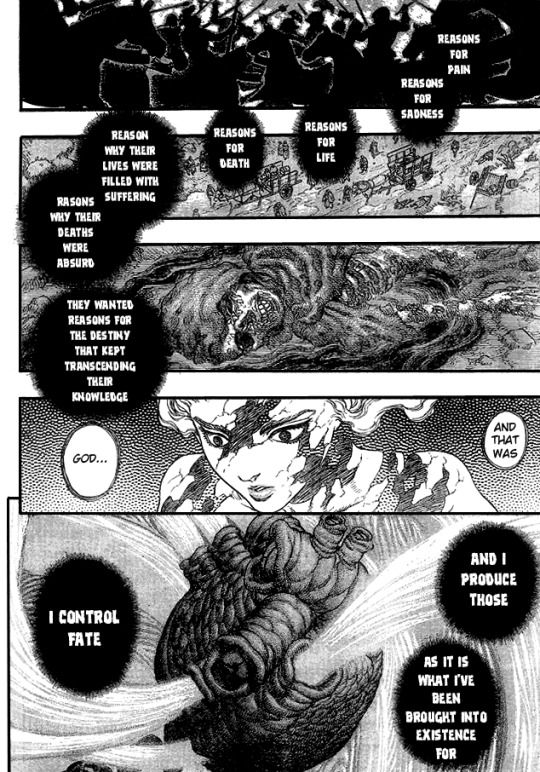
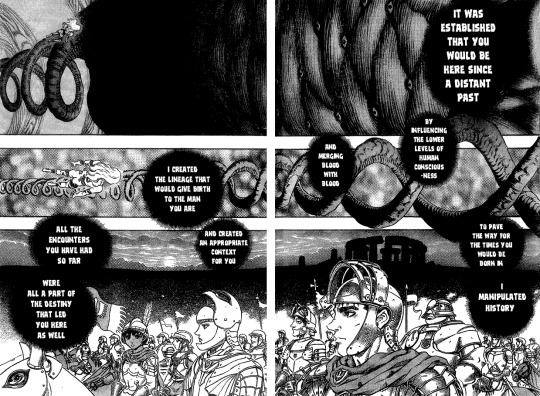
“It was established that you would be here since a distant past. By influencing the lower levels of human consciousness and merging blood with blood I created the lineage that would give birth to the man you are. To pave the way for the times you would be born in, I manipulated history. and created an appropriate context for you. All the encounters you have had so far were all a part of the destiny that led you here as well.”
Now, going into the Griffith specific stuff. This is has always fascinated me because if you think about it, basically IoE is saying that everything in Berserk to date (and presumably everything that follows) is arranged to create the circumstances under which the specific person that Griffith has been designed to be will make the choice that brings him here.
One of the things I learned in psychology yars and yars ago is about this concept of psychological free will vs. like I guess religious or spiritual free will? Because ok there are multiple was to conceptualize what it means to have free will, right? We have the more standard version: are our lives planned out for is in advance by an outside force (typically a deity), or are we free to do whatever we wish to do? Free will vs. Predestination.
Is there such a thing as being destined to die tomorrow or does whether you die tomorrow or not rest entirely on what you choose to do? And if there is such a thing as being destined to die tomorrow, are there ways to prevent that from happening or is trying to fight it just hubris in the face of powers beyond your comprehension?
But there’s also the psychological concept of free will: given the interaction of your personality and your experiences and your capabilities and this Thing that Happened, is there really more than one thing that you could do, or is it inevitable that you will make the choice that you made because its who you are?
If Person A is rushing to work and comes across someone having a medical emergency on the sidewalk, is their decision about what to do (stop, ignore it, call 911 and keep going, etc) determined wholly by the kind of person they are, or can they just do whatever? And more to the point, even though there is nothing stopping them from doing any of those things, are they themselves, being who they are, able to do anything other than the thing they end up doing?
Berserk is interesting because its take on fate is something like a combination - the end is set by IoE, but the way you get to that point is by IoE setting up your life in order to shape you into being a person who would make the choices necessary to arrive at that point. Unlike traditional predestination - that greek tragedy stuff - there’s your destiny and fighting it is hubris, because that fate comes for you rather than you necessarily arriving at it - the only thing that makes an endpoint inevitable is how perfectly maneuvered people are so that when you arrive at every crossroad, even if you theoretically could go left or right, because of who you are, there’s really no way you would go anywhere except the way IoE wants you to go.
This is why I often say Griffith was designed to be strong but also designed to shatter when hit in the right spots. He has to be strong to get to where he went, but he also needs to be fragile so that when the time comes, IoE can put the right things in his path to push his specific buttons and get him to do what he has to do. This is one reason I struggle with the idea of blaming Griffith - on one hand there’s the argument that individuals have to take responsibility for their actions regardless of why they’re undertaken. But at the same time, I can’t help thinking... there’s no person in existence who wouldn’t break if they literally had God arranging the entire world into the specific configuration needed to break them.
More than that, though! If you think further into it, it also means Guts was designed to be someone who Griffith would desperately love and then be abandoned by. And that means Guts’ life was designed to create a person with all these insecurities and strengths and weaknesses that makes him the person he is. It’s all very interesting to me, these questions of free will and predestination.
It does, however, lead me to wondering about the edict he gives Griffith at the end of this chapter.
More on that in a minute!
(boy do I hope that was all coherent)

So, here’s the thing that explicitly curbstomps the idea that Griffith was specifically sent with the rule that he must destroy things and ruin humanity. I mean break it down, right – IoE is a servant of the will of humanity, ergo its desires are humanity’s desires. Griffith, being human, therefore is a part of IoE just as IoE is a part of him, and thus his desires are also IoE’s desires...
お前の行い自体が種としての人間に相応しものになるだろうたとえそれが人々の苦しみてあっても救いであっても。
So that’s the original Japanese line.
Which, as far as I can tell (and anyone better with Japanese than I am please do feel free to correct me, and I’ll fix it) means something like:
“Your actions in themselves will be appropriate to humanity as a species even if it means hardship/pain or rescue/salvation for humanity.”
As a pretty interesting sidenote, the word used for salvation, 救い, specifically references religious salvation. So there you go. Antimessiah/Messiah.
In any case it does put the lie to the idea that Griffith was given the instructions to destroy things or ruin things or make people miserable, like his instructions are literally just “do whatever, and whatever happens will be appropriate.” That said, remember “Your desire is my desire as well.”


I really think Griffith is at his prettiest during this chapter despite being half-formed for most of it. But anyway.
Ever think about what this encounter must mean to him? Half of Griffith’s motivation is the desire to see what he’s capable of and where destiny will lead him.
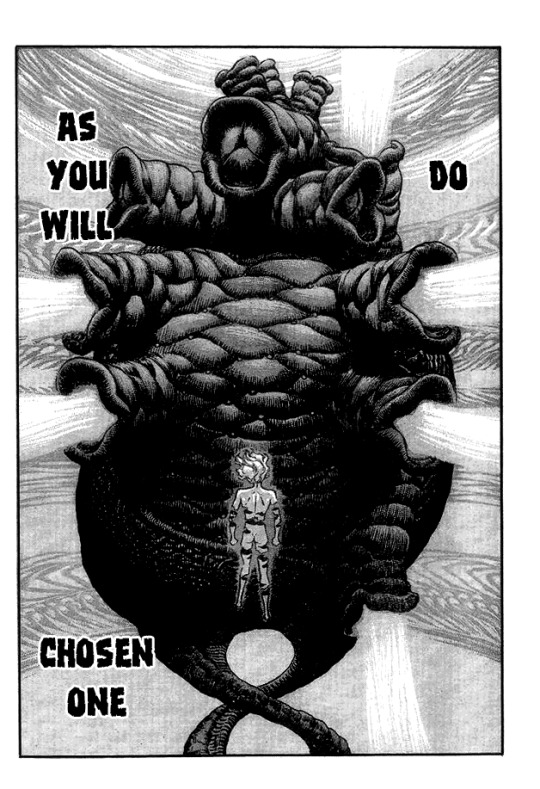
So okay now we get back to psychological free will. Because obviously Griffith wasn’t sent with the instructions to do a specific thing, just to do whatever he likes with the assurance that whatever he wants is also what IoE wants by the nature of Griffith’s own humanity.
But okay, that does raise the question of whether GRIFFITH has free will (in the psychological sense), right like... at the end of the Eclipse, the other Godhand seem to indicate that they already know how this will turn out – Griffith will bring an age of darkness on the world, at least for a while. Similarly, before he’s even incarnated, Slan is sending priests visions that say he’s going to unite all of humanity into one nation.
So like, inasmuch as the IoE is part of humanity’s will and vice versa, it seems like it knew where this was going even as it told Griffith to do whatever. And this may be difficult and abstract to convey and I hope I can phrase it properly, but what it says to me is something like... Griffith acts freely on his desires, but his desires are in line with IoE’s desires (which are in line with humanity’s desires) specifically because he was designed to be a person who would have those desires. As such he does what he wants, but what he wants to do will inevitably result in ending up where IoE is trying to get, whether he is or is not specifically choosing to try to create that effect... because the outcome of our actions isn’t always what we intended.
And this isn’t me trying to let Griffith off the hook for the age of darkness - I’m not even convinced the age of darkness is a bad thing in the long term. I’m more saying that regardless of what his intentions are, the outcome of his actions will inevitably be in accordance with the destiny woven by IoE and desired by mankind’s collective will... regardless of whether or not that outcome is what he was aiming for.

Sidenote: Griffith chooses his own form, which makes me wonder what was going on with Ubik.

And then he heads into the world at large.The swirling of the ocean of souls echoes his reincarnation at the end of Conviction.
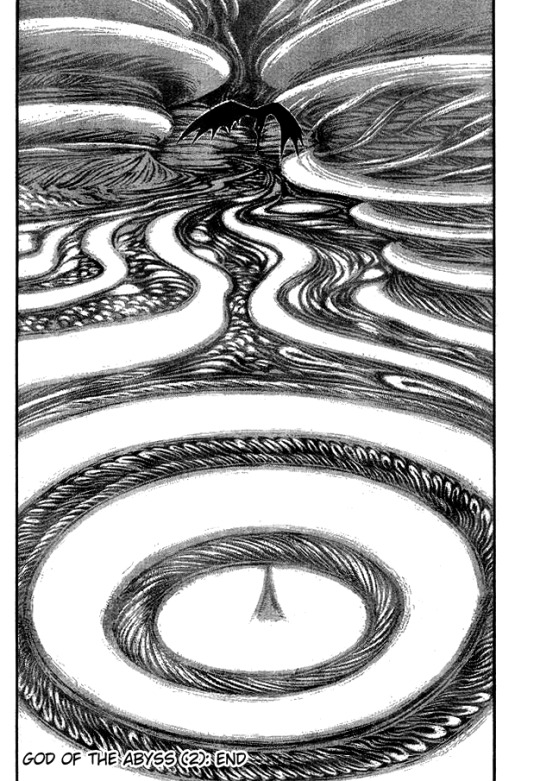
And the end.
Okay so like, what I get from this is basically... Griffith was created to be the person needed to fill the role he’s filling, and God designed the world around creating him (and presumably did the same to create say Void or Slan). Whatever his intentions are, the actions he takes and their outcomes will ultimately align with humanity’s desire, which is also IoE’s desire.
This is kind of what I mean when, for example, someone suggests that Femto raped Casca in order to create the demon baby that would ultimately become his vessel and I say... I don’t think that’s why FEMTO did it, but it may well be why it was done.
But what really strikes me about this chapter is how it sets the stage for ... the stage that is the Berserk world. What I mean is, and I’ve talked about this before, the way the Godhand behave and especially the way NeoGriffith behaves, is very performative right like they want an outcome and they move things around like pieces on a chessboard and then they do the things needed to nudge humanity in the “right” direction which is something I’m sure to talk about a lot once I get farther into Millennium Falcon. Which isn’t unusual in itself, but because of who and what they are, they can move massive pieces, like... plague outbreaks or the merging of the astral and physical worlds. The Godhand’s manipulation of human history is epic, but then of course their creator goes a step beyond and manipulates centuries or millennia in advance and on a much larger scale. But in the end it’s all the same thing it’s just a matter of degree, and...
It kind of makes sense that Griffith is one of them, because that’s really what he was doing on a human scale even when he was human.
Anyway, that’s it, back to Millennium Falcon next, thank you for listening.
73 notes
·
View notes
Text
It's quite curious how Guts and Casca's arcs are opposites, which makes them complementary.
Guts is so active that he never rests, this is seen by the fact of how little Guts cares about himself or when he decides to leave the Band of the Hawk to find his own dream to be an equal to Griffith and how he decided to go on a revenge rampage instead of staying with Casca which caused the Beast of Darkness to be born as a result, and Casca is passive because she has always prioritized the dreams of others above her own plus she is in a constant fight to recover and maintain her agency that is constantly taken away from her.
Guts has to learn to be passive in the sense that he must learn that he should not do everything alone and that he has the right to rest, to be vulnerable by venting his sadness in a healthy way and enjoy the simple things in life and Casca has to be more active in the sense that she must have her own aspiration and must recover her agency.
It's Guts who encourages Casca that she can be more than Griffith's swords and values her for who she is and it's Casca who encourages Guts to relax, to be vulnerable and that he can do and enjoy other things than just fighting.
17 notes
·
View notes
Text
The thing I like about Berserk most of all, ironically for me, is that the characters are dominantly human.
I usually never like the human characters or root for the human side in Man Vs Monster tropes, cause humans are usually dicks being unfair and judgemental and most man v monster is just Catholics vs Jews or Catholics vs. Protestants, or Catholics vs Heretics of any other flavor 2.0
But Berserk doesn't play by those rules, ironically - VERY ironically, considering there's a whole arc dedicated to the Holy See and Catholic church torturing heretics for funsies.
But that is exactly what I love about Berserk - there's no “man must become a monster in order to defeat one”, no - man is already a monster, plain and simple. Anyone, anywhere, can become a monster in the right circumstances - and those circumstances are A) not at all universal and B) not always tragic or relatable or heroic. They're often vile, disturbing, disgusting. Hypocritical. Nasty. I wont go into detail - if you've read Berserk, you already know.
But that is how it is - everyone has their reasons, everyone has their moments - and they're not always pretty, or justified, or sane. Sometimes the person in those moments thinks so - but often in Berserk you see people, ordinary humans, doing heinous things knowing they are doing something injurious or harmful, purely because they can, or they want to, or because they think they'll be rewarded in some way. Inquisitors torturing innocent people because they think God will reward them is among the least of it. Hell, the Band of the Hawk is unto itself a Mercenary Band. Judeau said himself they had all types of folk in their rank - that they didn't care about pasts, only futures. Criminals, bandits, you name it. Judeau himself was a performer - not a nice thing to be back then - Corkus was a common bandit/petty theif. They had decent folk the same; second sons would have been trained knights without a title, not that being a knight made one at all decent. Plenty of nasty, rapey ones existed.
Point is, the only black and white in Berserk is the colour coding of Griffith and Guts (which is deliberately ironic in multiple ways) and it lays that out right from the start.
Grey. There's so, so, SO MUCH GREY, it's all there is, anywhere, in anyone. There's no virtue without vice. There's arguably the opposite- Wyald comes to mind - but even he is just supremely dark grey. His actions are as despicable as possible, but his reasoning is that of a child. He is so dark he might as well be black, but I still hold that he is just the deepest grey- similarly, Laban is surprisingly very chivalrous, and a genuinely good and honest man. Even in the face of the destruction of everything he knows, he remains virtuous and steadfast. He is mostly white - as white as its possible to get in this story and still be somewhat grey; for even he can't help his humanity and despises those which would assail himself and his country, as a knight ought to I suppose.
What's interesting here, though, is that both our image of the deepest grey and the palest are both side characters. Wyald plays a pretty important role in the plot, but so I would argue does Laban, for what little we see him. He demonstrates that even in a world collapsing, humans can still have hope, and that when calamity strikes is when humans are most keen to band together and support each other in the wake of common circumstances (plague, famine, disaster).
The two main characters however (well, 3 if you count GA Casca) are, despite their respective color palettes, extremely mid. Yes they both do some extreme stuff, but morally they’re both opposite but still similar shades of grey- and personally I’d argue their palettes reflect the exact hues they possess, with Guts actually being the darker, more morally corrupt one. But that’s a post for another day.
Berserk is the ultimate tribute to the Cynic's philosophy. And I am nothing if not a cynical philosopher lol.
25 notes
·
View notes
Text
How Staging Compliments The Narrative
One of the thing I really enjoyed while reading Berserk was Miura's attention to staging. Every character interaction he draws is so purposeful and layered with so much meaning, which of course means it's the kind of shit that keeps me up at night thinking about it.
Really I could start anywhere with this, but I chose to start here because it's something I only noticed after my second read through of GA and it just blew my socks off. Image heavy, I swear and interrupt myself a lot. I'm having a good time xD

I love how this sequence is staged. Griffith never stands up. From the moment Guts enters the room Griffith is in a potential position of power, but he doesn't assert it. Even while surrounded by all the knowledge Griffith holds being displayed through the books along the walls and his mention of "light reading".
I love how Guts is just splitting the bubble with his fat head here, letting us know how ridiculous he finds all this nonsense to be. He's bringing Griffith down to earth here in his mind. This is the dirty work to him, all the time Griffith spends up here educating himself with culture. And asserting his opinion here in the middle of Griffith talking is what adds to his metaphorical higher ground.
It's just so humbling to see, tbh. Griffith allowing Guts all the power in this situation despite their respective roles as soldiers, because it's not about that here. He invited Guts over to a familiar place, he made an effort to make Guts feel comfortable sitting with him (giving him something to engage with). They're hanging out. They're vibing. (Guts comments about how there's more books than the last time, indicating he's been in similar situation with Griffith before, very nice inclusion Miura.)
For a minute they're on the same level. Griffith hands him the kama sutra, invites Guts to read it, and Guts does! He sits his happy ass right down to engage in some activity mirroring with his best boy, easy. It cute! It's representative of how their dynamic could be off the battlefield, just mutual engagement.
But the second Griffith makes his request Guts has the upper hand again.

Guts stands up, he crosses the distance between them easily, getting back into Griffith's space.


And when Griffith gets to the point, that he wants someone killed? There's no grandstanding, there's no epic speech or proclamation. He keeps his ass in his chair and his body language open and let's Guts come to him. And it's so obvious that Guts is taking this request seriously, look at all those thoughtful speech bubbles. Griffith makes a point to detail everything for Guts, offering him more power. He didn't have to go over the how's and why's for Guts here, he didn't have to describe what the hell an assassination was. But he did in order for Guts to make an informed decision. And Guts is processing each of these points Griffith is willingly handing over in a moment of vulnerability.
"I still haven't talked about this with anyone."
Ultimately, the decision is up to Guts. It's an olive branch.
What Griffith is saying here is: Participate in this with me. Let's do this together. You're the only one I can trust with this.
It's an honest to goodness collaboration. Griffith does the research, he hires the goons, and Guts makes the kill.
And like, whether Guts realizes this is happening is definitely tricky. My read is that he understands it intrinsically, at least. That boy be feeling their connection in some kinda way damn near every chapter, even if it's only on an instinctual level. He doesn't get the nuance Griffith is affecting here (does he ever? He hates The Royal Game and shits on it constantly lmfao) but whether it's a request or an order Guts is doing it because he dedicated himself to this man. He wants to.
And just, holy shit does this enforce Guts overall narrative in GA about belonging and family and carving a place for himself. About bonds. It's Guts' bond with Griffith that allows Guts (and the entire band, but this isn't about them rn) to reach places they never thought they could reach. And for Guts that's a place where he is understood, respected, encouraged, and loved. A place Griffith made for Guts at his side.
Anyway the empowered Guts continues!
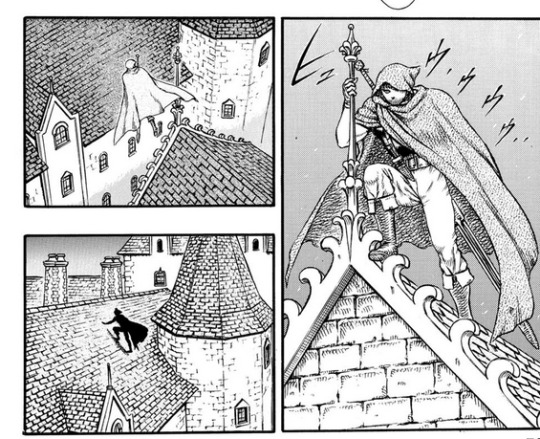
In this position not only is he higher on the stage than his target…
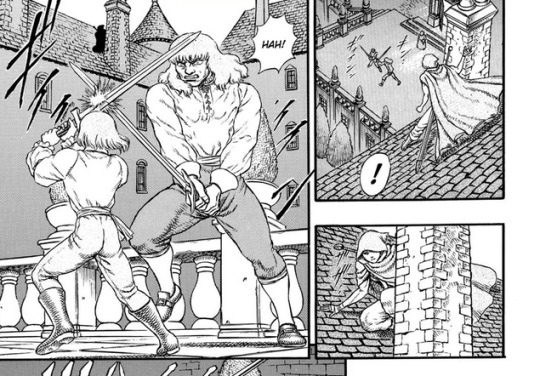
But also, satisfyingly, he's reached a position above Griffith through their collaboration. This is literally the next chapter. We go from Guts standing over Griffith in the office to Guts standing over everyone within the vicinity of the Brother of the King. Guts is so damn elevated here. My man Griffith's effect is just that strong.
Miura's staging is just that strong.
Eventually I want to get into how this flows expertly into the Promrose Hall Speech, but that's where things take a dark turn and I want to focus on the positive impact Griffith has on Guts for a bit.
I just love their dynamic, it's so fucking sweet man.
149 notes
·
View notes
Text
Reading for Redemption in Post-Golden Age Berserk
Below is some rambling thematic/character analysis and vague gay flapping about how Berserk could have *ahem* or should have ended. So please enjoy my little theory brain working on overdrive again (if you like) as I discuss how Griffith and Guts’s relationship could have been resolved through one decisive act... No it’s not killing Griffith, get out of here!
To follow are some ideas including (pearl clutch):
Griffith’s “redemption”
An act of love between Guts and Griffith
Guts becoming a shield instead of a sword as the culmination of his character arc
A second (!) sacrifice
This is a bit of a grasping-at-straws deep-dive into post-GA Berserk, but one that is I think actually surprisingly well-substantiated, that is if you’re willing to follow me into the vague realm of thematic parallels. For those of you who were unsatisfied with the way this latter part of the story treated G&G's relationship, I hope you might especially enjoy it.
Caution: I’m basically reading the entire post-GA story through the lens of Griffith and Guts’s relationship, because to me that’s the emotional and narrative heart of the story. I think we can in fact view a lot of post-GA relationships and characters through this lens, and the story becomes, imo, richer for it. Think Jill and Rosine, Serpico and Farnese, just for some easy ones.
Please keep in mind that this is obviously 1000% empty speculation and useless headcanon at this point, and it relies on drawing connections between seemingly disconnected scenes and characters, but it’s fun to think through this stuff, so I hope you enjoy this little journey into my sad gay heart and hopefully it’ll at least give you some food for thought by the end.
I’m also relying on previous meta written by myself and @bthump, so if you feel you’re missing context for any of this, please check out my previous two metas and basically bthump’s entire archive (an intimidating prospect that I assure you is totally worth it).
For all those simply interested in “Guts chops off Griffith’s stupid head”-esque discussions... Well, you’re welcome to stay... but strap in.
Part 1, On Post-Eclipse Griffith: Griffith Needs to be “Redeemed,” But What Does That Actually Mean?
The way I read NeoGriffith, and basically every moment post-Eclipse for Griffith generally, is that he is living his own personal hell. He is lonely, he is miserable, he’s playing prince charming in an empty and unfulfilling (heterosexual) relationship with Charlotte. He is loved and adored by everyone around him, he is the bearer of light, but I think it’s clear that in spite of this (and perhaps because of it) he still hates himself.
His last act as a human soul was to destroy himself by destroying those around him, and that moment was crystallized into the form of Femto.
And indeed, that shadowy other half remains very much present post-Eclipse. Femto and NeoGriffith are shown to be inextricable mirrors: the charming outward persona and the festering self-hatred beneath the mask. The two are halves of the same coin – Griffith’s two coping mechanisms, forever intertwined after the Eclipse.
We see this at play in “Backlighting” especially, where it’s made clear that Femto is always “with” NeoGriffith.


(Chapter 303, “Backlighting”)
(And side note, I hope to eventually post another meta about this motif of light/darkness in post-GA Berserk at some point… probably in like three years or something given my posting history lol)
In addition to this continued presence of Femto as an embodiment of Griffith’s self-loathing, we are also clearly shown his loneliness as NeoGriffith, and also his dissatisfaction with his life, in every panel where we see him standing alone/isolated from his new Band of the Hawk.
However – and this is where I begin my pitch for reading the entirety of Berserk through the Guts x Griffith lens – I think his mindset is also communicated to us as reader indirectly, through the voice of a different character entirely: the Pontiff. A minor character to be sure, but take a look at his inner monologue in Chapter 264. It’s both visually and rhetorically associated with Griffith.
See the parallels in the theme of repression of personal desires, a zealotry-based leadership role, light/darkness interplay and mirroring, castle and hawk wings imagery, and an assertion of worthlessness:
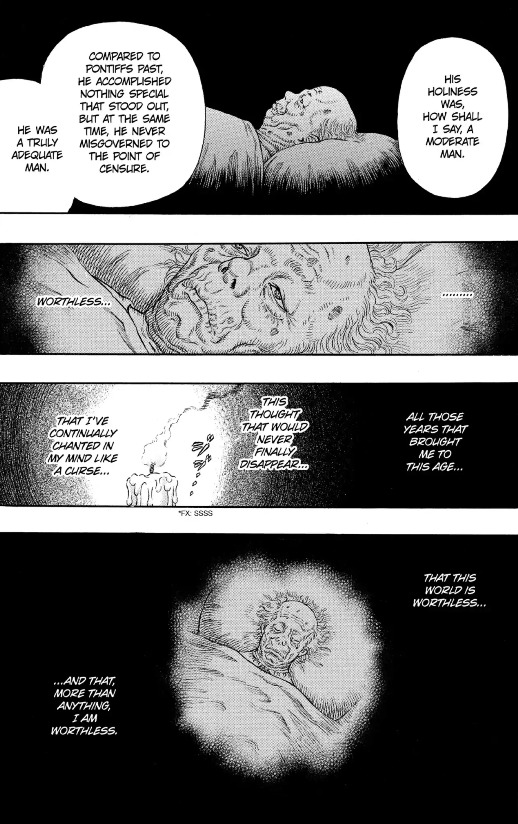
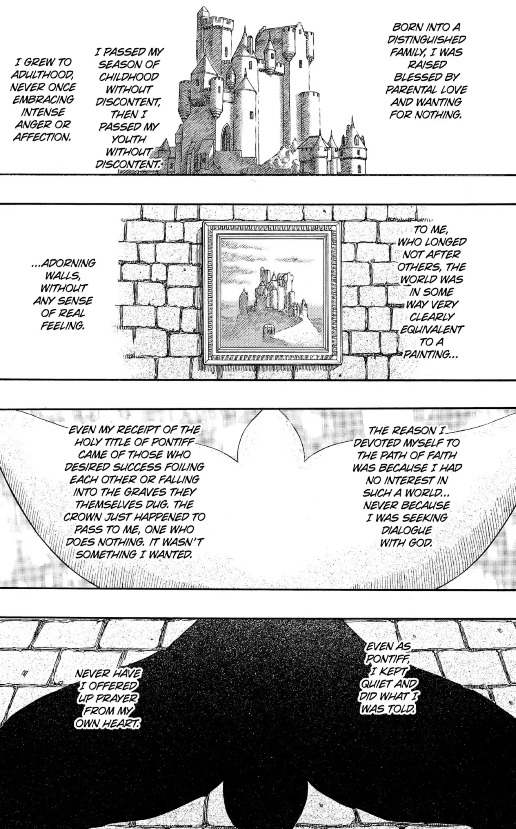
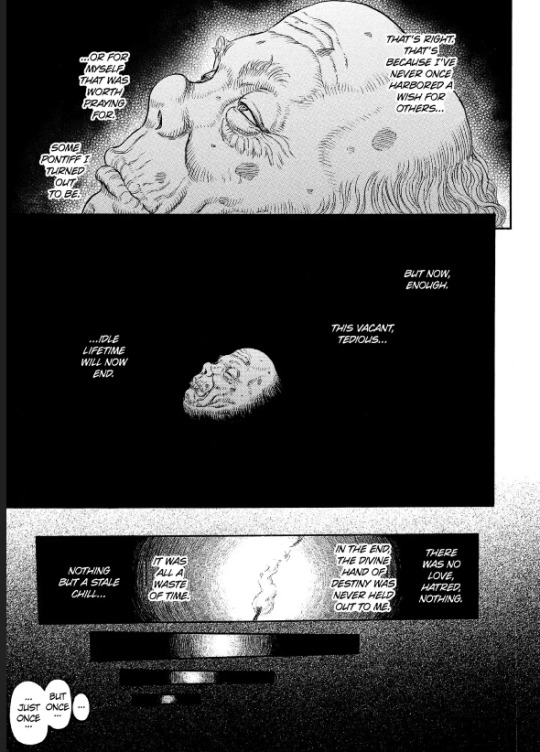
(Chapter 264, “Divine Revelation”)
Tell me that doesn’t sound suspiciously similar to someone else we know!
Now this is the type of thing that I find post-GA Berserk does a lot – it gives us these highly emotional moments about characters we really don’t know or care very much about as readers. It can lead to a bit of disconnect and feeling that the story has cheapened itself by highlighting these random characters. However, at least for me, this recurring pattern can be recontextualized by reading these charged moments as analogues for other characters, in that they are giving us insight through parallels with characters we know and care more about. I realize there is no in-text justification for doing this, but it provides a richer post-GA reading experience, at least for me, and hopefully for some of you as well.
So, through the Pontiff, I think we’re being granted a small glimpse into what Griffith might be feeling in his new life. Lest you think I am grasping at straws, which I totally am, nevertheless I offer you this: to Griffith too, the world in his new life has become a pretty painting, a castle on the wall, but he is left cold and lonely, stranded in the dark. “There was no love, hatred, nothing.” The absence of everything, specifically his everything, the world-shattering pain and love that Guts represents for him, remains a void in Griffith’s life.
(And as a bonus, also note the scene’s prominent light/dark reflection of the black and white Hawk – i.e., Femto and NeoGriffith, as visually paired and inverse)
Now, what does this have to do with Griffith’s capacity for “redemption”? Well, according to my previous readings of Griffith’s motivations behind sacrificing Guts and the Hawks, I do not believe that he feels any remorse or regret about the sacrifice. That’s because in order to feel regret, he would have to believe that both:
There was another choice he could have made
He deserves to feel something other than pain
I would offer that regret doesn’t belong in a headspace where Griffith thinks he is currently paying the price for his actions – with his emptiness, eternal suffering, repression, self harm, all of it. His life as NeoGriffith is, for him, both imprisonment and penance – it is the embodiment of the idea that he has to live as a monster. This is him reaping what he’s sown, "bear[ing] his evil and confront[ing] his destiny" as Void puts it.
In other words, he can’t regret his decision because he’s living with what he thinks he deserves. To admit otherwise is to admit that he doesn’t deserve this torment, which should be unthinkable to someone who still wears his self-loathing as a literal suit of armour.
And yes this perspective is extremely selfish, it’s not seeing the world from the perspective of those who he has harmed by his actions, but, evidently, that’s what self-loathing can do to people.
To conclude Griffith’s arc in a satisfying way, I would have liked to see him confront his actions, to experience regret, to repent from a non-selfish perspective. However, to do so, he would have to finally see himself as someone worthy of being loved, and to recognize that he in fact was that person once. That the sacrifice was a mistake after all, because he was loved by Guts all along.
The story has set up the fact that Griffith still absolutely needs Guts. Griffith at his most traumatized, at his moment of greatest despair needed (and now still needs) help to escape from the hell he’s living and thinks he deserves. And it’s all because he’s the victim of a misunderstanding that has led him to mistakenly believe he was never loved and was never worthy of love.
He chose the sacrifice because he was told by the Godhand that he is too dirty, too evil, to be redeemed or to be loved, in spite of Guts loving him all along. This is the belief that tore their relationship (and the world) apart. And it was a mistaken one! Guts is the one with the ability and the willingness to give him that: to right that narrative wrong. From this perspective, the only thing that will “save” Griffith, to allow him to repent and acknowledge what he’s done was a mistake, is an expression of love from Guts.
Now, I would have believed that this ending was unlikely or impossible except for the fact that Guts is not only aware that he fucked up with Griffith and is consumed with regret over it, but he has also spent the rest of the story trying to right that wrong in misguided ways (i.e., through Casca instead of through Griffith). And given Guts’s inability to fully embrace his hatred of Griffith, because he still loves him, I suspect that in fact all it would take to be swayed into redirecting this back to Griffith is for him to understand what Griffith is actually feeling (still human underneath, heart beating for him and otherwise dead inside, consumed by self loathing, believing he isn’t worthy of love).
I basically think the post-GA story was set up to end with Guts demonstrating his love for Griffith in some way. That’s the reason why the story continued after that point. And in fact, Guts being given a do-over has been foreshadowed explicitly – karma is a spiral, and “those children” have the chance to right the mistakes from the first time around.
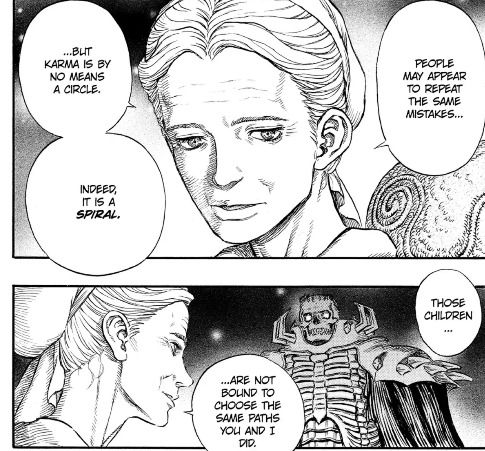
(Chapter 222, “Claw Marks”)
Some sort of do-over seems both narratively and generically necessary here – Griffith has been operating since their second duel under a mistaken belief about how Guts felt about him all along, and Guts has the key to fix it.
If the narrative ended without righting that mistake, undoubtedly in the most juicy, melodramatic circumstances possible (e.g., perhaps it would be too late to matter as both are poised to die anyway), it would be both narratively unsatisfying and incomplete. This mistaken belief – that Guts never loved Griffith – lies, after all, at the heart of the story, it’s what made everything go wrong in the first place. Narratives about misunderstandings must correct them for the emotional payoff, I think it was simply a matter of when it happened and under what circumstances.
Part 2, On Foreshadowing: There Are Lots of Interesting Parallels Between Pre- and Post-GA Berserk, OK?
One idea for how this narrative resolution might have gone down I’m also taking from a non-directly G&G related plot beat in post-GA Berserk.
Now, we all know about the explicit and more subtle (read: gay) parallels between Rosine/Jill and Griffith/Guts drawn throughout the Lost Children Arc. But what if I were to suggest that the final note of their relationship, Jill throwing herself on top of Rosine, might have offered a thematic parallel to Griffith and Guts at the end of the story? Perhaps Guts might do the same in a moment of love and pain:
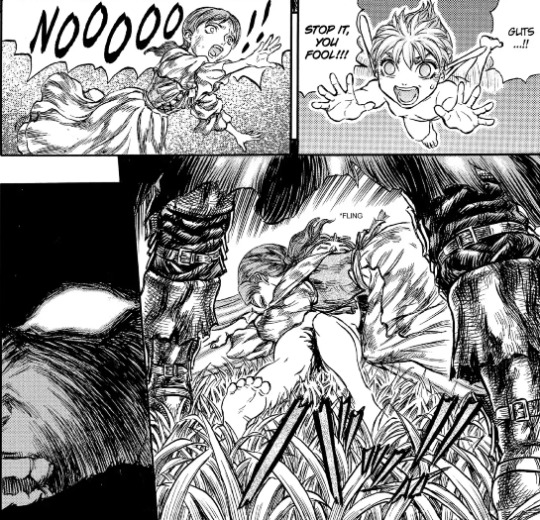
(Chapter 116, “The Way Home”)
This hope and a prayer (i.e., super amazing thematic prediction that isn’t based on any concrete evidence whatsoever) would have been a neat conclusion for the story, tying together a bunch of story threads in an incredibly simple and elegant way:
The narrative misunderstanding/wrong at the heart of the story (i.e., that Guts never loved Griffith) would finally be finally put right
It provides a neat resolution to both Griffith’s and Guts’ character arcs
The parallels are on point
To expand on this, in terms of character arcs, on Griffith’s end, a moment like this, perhaps where Guts bodily protects Griffith from a killing blow, would finally allow him to correct his fundamentally negative and damaging view of himself that has defined his entire character arc, the view that has led him to believe that he should bury himself under self hatred and repressed desires. Because if Guts sacrifices himself for him, it would not just tell but show Griffith that he was in fact loved all along. This act would finally provide him with a genuine sense of self and self worth through a love that is entirely reciprocated (instead of through dreams: either selfishly or selflessly pursued).
This would be incontrovertible evidence of Guts’s love for him; one of the main problems in resolving this narrative misunderstanding is to create a situation where Griffith can actually believe that Guts’s expression of love is genuine – how can he possibly believe this through anything other than an extreme, incontrovertible act? And so I offer Guts sacrificing his life for him.
On Guts’s end, it would finally allow him to take his life into his own hands and truly self actualize – he’s been passively reacting for most of the story, and this would be a chance for him to actively do something, to finally make a meaningful choice, and it would be an act that would allow him to unburden himself of hatred, regret, guilt, etc. It would also fulfill what I think of as one of Guts’ most deeply held personal values and beliefs – his desire to save someone through an act of love rather than through his sword (and yes I read Guts as fundamentally a caretaker at heart, more on this below).
In terms of parallels:
The theme Berserk often returns to about the merits of being with someone v. the burden of “protecting” someone would finally be resolved with Guts (likely) failing to protect his loved one, but also in doing so finally being with him in their (likely) dying together and finally fully coming to an understanding of each other.
Guts realizing that his life can mean something outside his sword (what he’s been looking for his whole life) – basically becoming a shield instead of a sword at the end of the story.
Griffith’s sacrifice at the end of the GA would finally be mirrored by a reciprocal act by Guts in the form of a second sacrifice, but this case one that is born out of love instead of hate. This idea in particular I need as a reader so badly, particularly because the acts they each took on behalf of the other across their relationship are so uneven – Guts has just been so passive overall and as a reader it would be incredibly satisfying to have him take up his role as the protagonist and take the final, decisive action to resolve their relationship. This is also why I can’t get on board with any resolution where Griffith has to take another action “for” Guts – imo the resolution of this arc should rest on Guts’ shoulders.
Basically, it would give both of their lives meaning in one swift move.
And what’s especially neat about this potential conclusion to the story is that I think the story gives us some really provocative small moments that foreshadow it, where we're shown that love can triumph over hatred.
At least some sort of reconciliation/act of love comes up again and again in the story, though in seemingly unrelated situations that imo just have too much in common with Guts/Griffith to dismiss outright. There’s of course the “karma is a spiral” moment and the Jill & Rosine parallels that I’ve mentioned, which suggest that it’s possible to still right a deep-seated wrong, to “save” (at least emotionally, if not physically) someone who has fallen into darkness through an act of love.
But there’s also the idea of saving one’s “other half” “from being torn to pieces in the storm” via Serpico and Farnese:
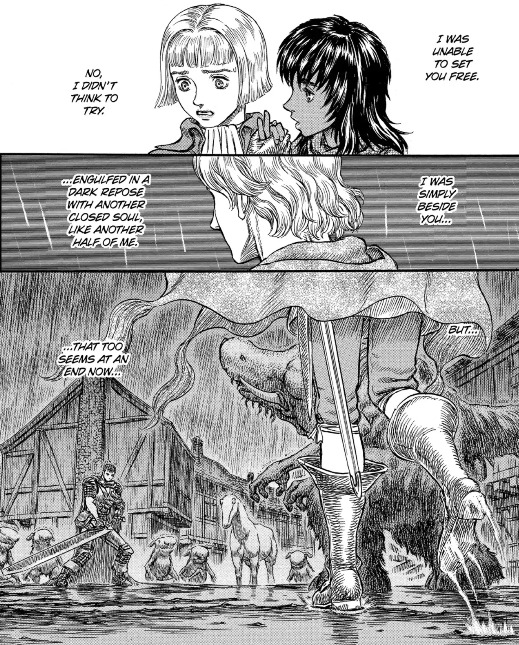
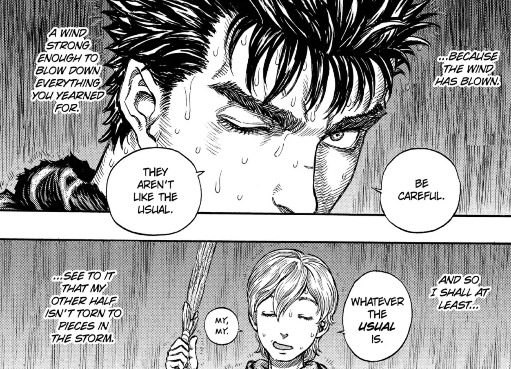
( Chapter 211, “Evil Horde Part 1”)
God, this passage. First off, I think Guts and Griffith's relationship is being explicitly paralleled through the word choices (“other half”/”half of me”), but also because this sentiment is basically echoing all of Guts’s paralysis and helplessness at the moment of the Eclipse.
Like Serpico, he too was unable to set his loved one free from a prison of darkness and hatred, something perfectly visualized in Guts trying in vain to pry his way in to Femto’s eggshell – as well as all the regret, hatred, and feelings of impotence (i.e., the darkness) that came along with that failure.
The “I didn’t think to try” aspect to this is also relevant and interesting given the changed context of pre- and post-Eclipse G&G. Guts during the GA didn’t see what Griffith was going through as leader of the Band of the Hawks as being a prison, a burden, or damaging to his sense of self; he simply thought he was “flying alone” above all of them but couldn’t conceive of how personally devastating that was for Griffith. Now though, after Guts has taken up the mantle as the RPG group leader, he’s probably in a better position to understand this and to also understand that something better is preferable for both of them, even if it seems like it’s forever out of reach.
And yet Serpico’s statement seems to be a really significant idea in light of all this – it’s suggesting that maybe this dilemma isn’t over – that maybe Guts can still see to it that his “other half isn’t torn to pieces” in some new storm that’s brewing.
I also submit Case B: Luca and her tribute to “the chick [child] that died within the egg”… Now, while she’s specifically addressing Eggman throughout this scene, this moment also explicitly parallels Griffith as a similar child who died within an “egg.” Compare:
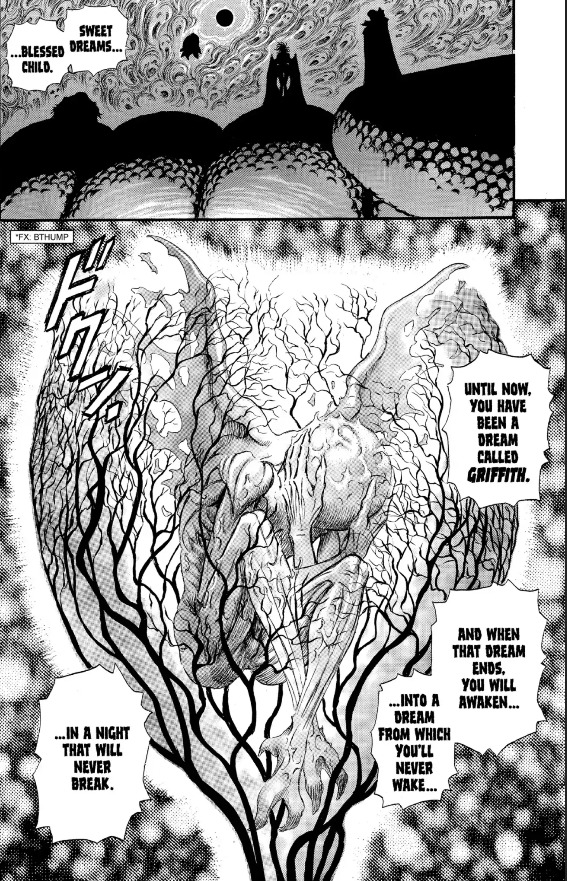

(Chapter 83, “God of the Abyss” and Chapter 176, “Determination and Departure”)
This is a “sinner’s” tribute to a child who died too young, who is now buried and alone, who has no one to love or mourn him. Again, I think the parallels to both Griffith and Guts are there, telling us that even those people who have done terrible wrongs, who have lived shameful lives, can still be loved (i.e., mourned), and that trauma does not have to define you or your legacy.
And this connection doesn’t just appear through the language choices (sinner, chick) but also through mirrored imagery between the above scene and these ones:
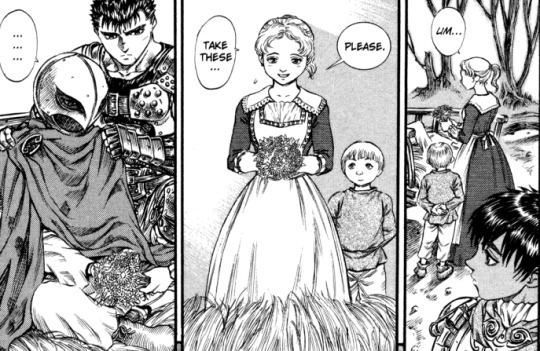
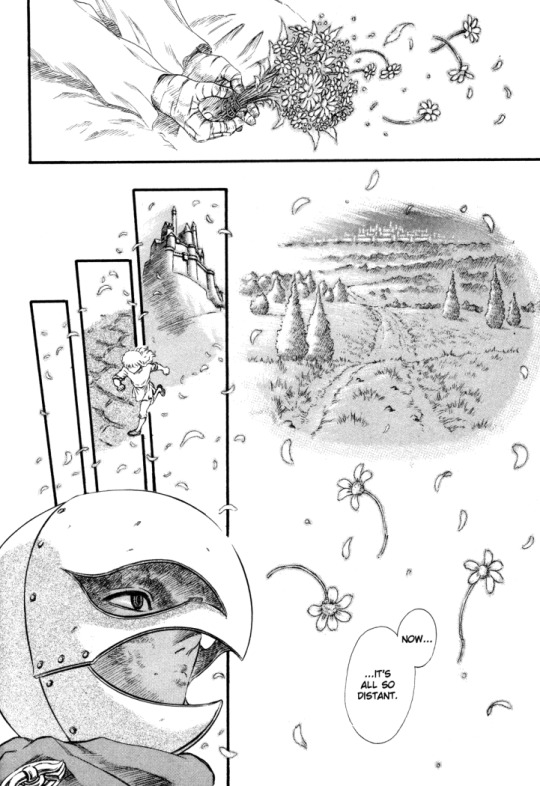
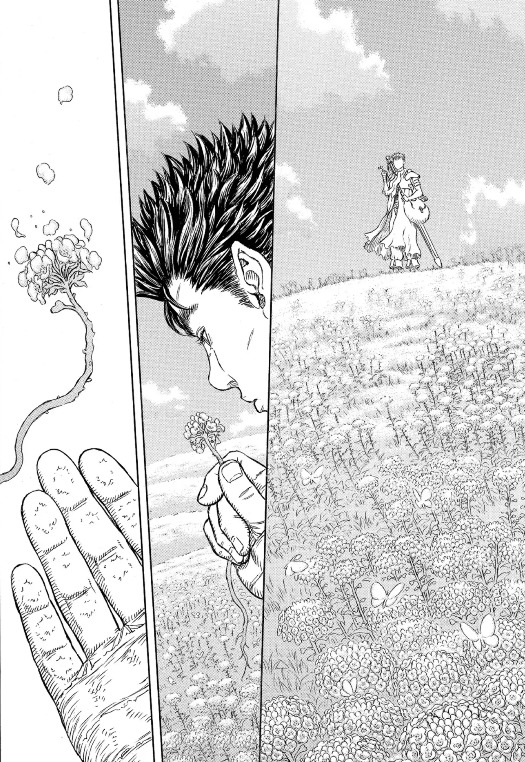
(Chapter 59, “Devil Dogs Chapter 1” and Chapter 331, “Spring Flowers of Distant Days Part 3” although admittedly the latter one comes much later, so it only works as a retroactive parallel)
The essential thing that Luca’s tribute is telling us as readers, is that in mourning (a form of love) someone evil and despicable, love offers the counterpoint, specifically the remedy, to hatred.
Part 3, On Narrative Conclusions: Why a Second Sacrifice?
So, my dumb little brain is telling you that the conclusion of the story should have been a scene where Guts makes a sacrifice for Griffith. But why?
Well, most importantly I think it offers a crucial structural parallel to the other sacrifices we've seen throughout the story. That's because there are some important distinctions to make between this sacrifice and earlier ones. This sacrifice would not be with a behelit. It would not be the consequence of magic or the gods meddling, the strings of fate, or an action born of hatred. It would not be a sacrifice that destroys people but instead one that actualizes them.
I think this is the best possible ending to the story, in large part because Guts demonstrating his love for Griffith is what was been set up to unburden both of them from their current armours (see: Femto) of imprisonment and their respective “shackles” of hatred.
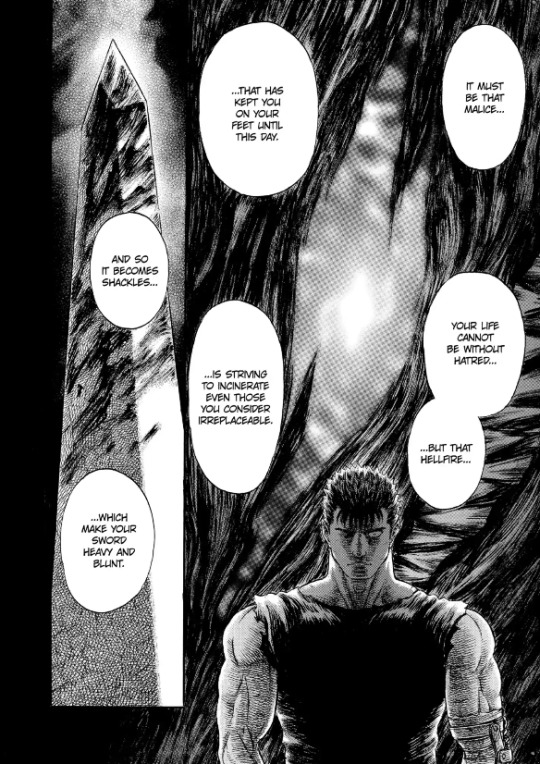
(Chapter 202, “Magic Stone”)
Now, on a character level I think it would be overly simplistic to say that the story is telling us that Guts will forgive Griffith. I think both characters too far gone for simple forgiveness between the two of them, I don’t think that was ever a realistic outcome to their story.
What they need instead is shared understanding and a shared declaration of love to help them realize who they are as people (loved and worth loving). That's why I think the Jill/Rosine parallel works so well, because it only needs to be an irrational action on Guts’s part (like throwing himself in front of Griffith to protect him) as a definitive expression about what Guts wants to do, outside of his usual waffling as well as any obligations or duties he might feel. A sacrifice by Guts would be a simple action, one taken because of him following his heart.
Guts making a genuine sacrifice for his “other half,” to save him, to finally know himself and know another person, creating a deeply honest a connection through an expression of love… tell me that’s not a perfect conclusion to a story about trauma and its devastating impacts on people and their relationships with each other.
Because I think it’s clear that the idea of not being able to truly hate Griffith is just as relevant to Guts as it is to Rickert:
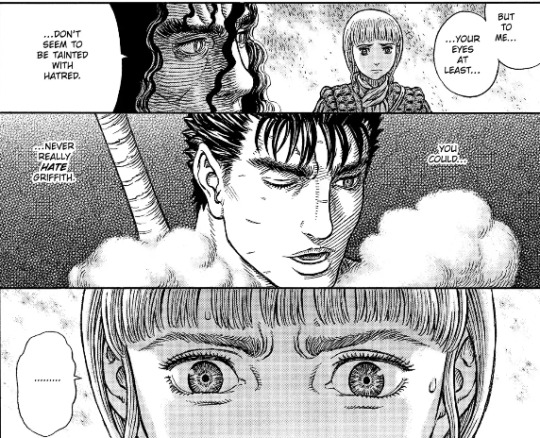
(Chapter 336, “Pandemonium”)
Guts says this to Rickert while looking sad, not angry. Maybe, just maybe, Guts is aware of his own feelings on the matter too. Perhaps he's as much speaking aloud as to himself here.
The wrench in Guts’ desire for that all-consuming hatred is, of course, that residual love he feels, the structural equivalent to Griffith’s own bthumping heart. In that light, that love could very well make Guts do something spontaneous and irrational, essentially bursting through his own darkness to definitively break the hold of the hatred that’s shackling him. Especially if he somehow comes to understand the pain and love that Griffith is still feeling too.
Now to be clear, I don’t think forgiveness necessarily needs to come into the equation here, and I think it’s psychologically reductive to say that Guts can overcome his trauma this way. I think those wounds run too deep, but conversely I think that his love does too. Basically I think the resolution to their arc absolutely could and should have remained messy as fuck. An act of love born from a crippling wound is as honest as it gets for these characters.
Now, the narrative explicitly tells us after it declares that Guts is shackling himself to hatred through his sword, that that the way Guts will go about this unburdening/unshackling of his hatred is through Casca, by taking up the sword for her sake as a “protection against hellfire” AKA as a protection against his own hatred:

(Chapter 203, “Elementals”)
But we see repeatedly that this is simply a “path [he’s] chosen,” not necessarily the only path or, indeed, necessarily the correct one. In fact, we see that this path is not actually succeeding at protecting him or Casca from anything. And that’s because when we look at Guts’s actions, he isn’t actually working to protect himself from his own hatred, because he can’t help but be reminded of his own trauma as a result of Casca’s trauma:
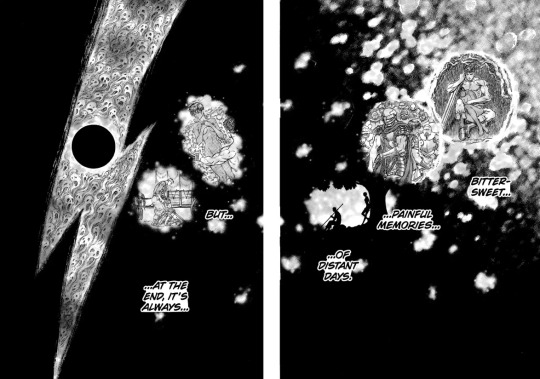
(Chapter 287, “Bubbles of Futility”)
“At the end, it’s always.” Trauma lies at the end of this road named Casca. And I think that’s because Casca is no longer really an independent person to him; she is a symbol, a burden, and a force that keeps The Struggle alive; she’s a means, not an end in itself. At the end, instead, it’s always that wound, and purposefully so. (And this interpretation is of course aided by her being a veritable doll throughout the majority of the rest of the story).
The Struggle and Casca herself aren’t presented as what Guts objectively wants as an end consequence of his actions – they are presented as the means towards something else.
The story drills into us the idea that this goal of restoring Casca is based on neither a positive and altruistic motive on Guts’ part, nor is it something that’s destined for jolly good things. See: the ominous foreshadowing with “The power to protect someone and the power to be with someone are different,” “fixing” Casca despite her own wishes, and Casca also seeing Guts as a monster from the Eclipse in her own right. In this light, I think it’s very appropriate that Casca views Guts in exactly the same way:
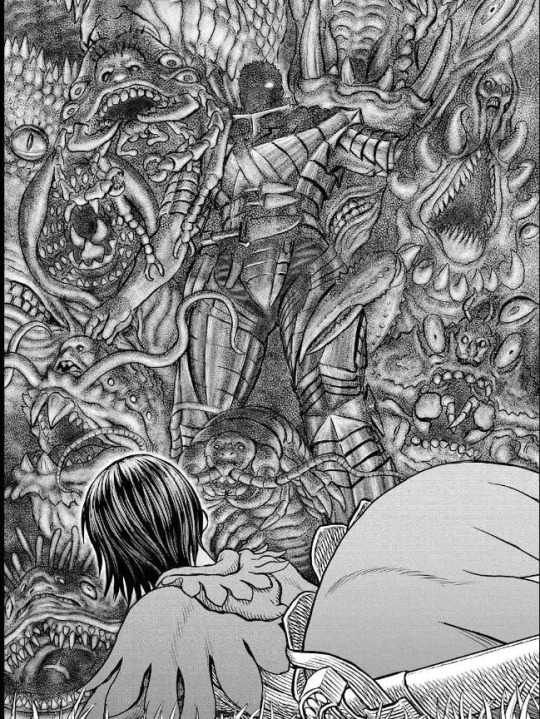
(Chapter 359, “A Wall”)
The “path [he’s] chosen” – The Struggle, the burden, the guilt, or everything that Casca is to him – isn’t good for Guts. It’s a path shackled, and it’s one that makes his sword heavy with guilt, anger, and hatred.
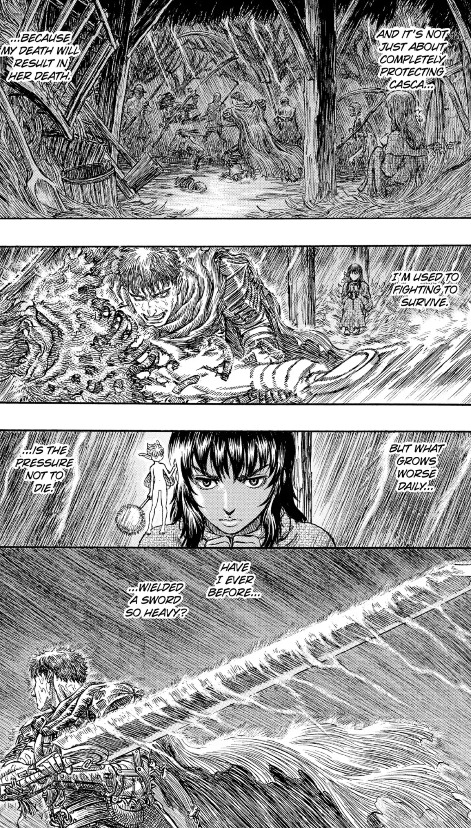
(Chapter 188, “Winter Journey Part 2”)
But we’re told that this isn’t a path that’s been set in stone (re: “those children are not bound to choose the same paths you and I did”). Guts has the power to choose differently than continuing to fight as a sword.
To sum up, I read Guts as explicitly thinking of Casca as a duty/chain/burden rather than as something personally fulfilling or as a genuine escape from his hatred. At the end, it’s always. And that’s why the conclusion to his story, at least imo, should lie somewhere else.
(And sidenote, this dynamic between duty and desire (giri and ninjō) is a huge part of the Japanese cultural (literary, dramatic, and cinematic) tradition, and I think it’s pretty clearly at play here, where Casca represents duty, Griffith represents desire).
To me, this is the whole point of Guts still being “bound” to Griffith, because in his heart of hearts, he still wants to be, because can’t ever truly hate Griffith, because he’ll always love him/be in love with him. And accordingly, any act Guts takes for Griffith at the end of the story will not happen because he feels obligated or burdened, like he does with Casca, but because on some level he genuinely wants to embrace love and be free of the burden of his Struggle and hatred.
~~
Small tangent on Guts: the question of what Guts actually wants is obviously crucial to the story, he’s the protagonist after all. But what does he want? To save Casca? Well, he did his part there. What now? To live with Casca? Continue The Struggle? To kill Griffith? Honestly, this question is actually really fucking ambiguous, which is kind of shocking for a protagonist (supposedly) three-quarters of the way through his story. (My headcanon reason for this ambiguity is that Miura wanted to maintain plausible deniability that this story is gay AF, which is also the reason behind Griffith’s motivations being so ambiguous as well).
To make this question a bit more abstract, if Guts was free to do whatever he wanted – as in, if he didn’t feel obligated to do what he’s supposed to – what would he do? If we can’t answer that question, I think we can’t truly understand Guts as a character.
My own answer to this question lies in reading those moments we see him as a caretaker as the most genuine senses of who Guts is as a person.

(Chapter 1, “The Golden Age”)
Those desperate moments of grabbing his mother’s hand as well as him trying to return the flower spirit to its home are the moments I think he is acting in line with the person he genuinely wants to be outside of any expectations of what he thinks he’s good at or what he’s “supposed” to be, or in terms of obligations in trying to impress someone or doing what he thinks is expected of him… He just does these things instinctively, because I think fundamentally he’s a loving person who essentially just wants to be loved back.
These moments are especially important to highlight I think, because in these moments Guts has no external motivating factors. He is a child who loves his mother, who wants to reassure her and be reassured in turn; he is a young man who wants to repay an act of kindness out of genuine good heartedness.
I will submit also the following, as a pretty clear crystallization of what Guts is about:
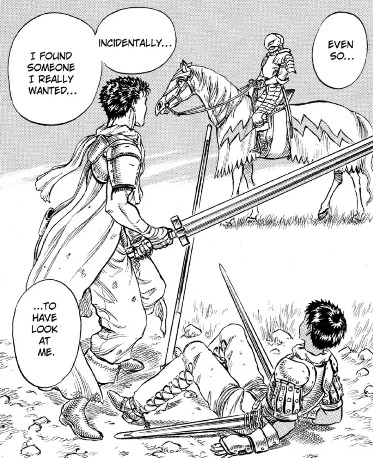
(Chapter 33, “One Snowy Night”)
If he ended up sacrificing his life for Griffith at the story’s conclusion, it would be exactly in line with this same impulse: to love and be loved. This is what has always, at least imo, defined Guts beneath all the shame, and rage, and guilt, and shackles of duty, and his feelings of inadequacy.
In becoming Griffith’s shield, he wouldn’t be protecting him through his sword, he would be saving him through an act of love.
~~
And OK, what I see as the smoking gun for this weird little theory comes from this very innocuous page from a random, seemingly unrelated story thread and chapter.


(Chapter 206, “Troll Raid”)
This page is framed in such an aesthetically significant way – a full page spread given to such a small line, like why unless it’s about more than some random townspeople.
The key that saves us lies in those we are trying to forget.
Guts has been trying to forget Griffith, to move on, for basically half of the story – this line very easily could be read as directly commenting on Guts’ journey and his inability to unburden himself.
BUT this line goes further – it’s not only suggesting that Guts trying to forget his past is not a good thing, it’s also suggesting that Guts needs to be saved somehow, and that it can happen through the one he’s “trying to forget.”
What does Guts need to be saved from? Well, from the burden of The Struggle, from berserking, from his sword, his regret, his hatred. And how can he do this through Griffith? By giving his love/life to him, as a shield instead of as a sword… It’s just too perfect!@!
So yeah, while this is all entirely wishful thinking, I also don’t think Guts sacrificing his life for Griffith is totally unreasonable or “out there” spec – I do legitimately see this as a once-possible and honestly pretty perfect ending to the story. So that’s what I’m fucking going with, goddammit.
Part 4, Conclusions
Imo Guts making a sacrifice for Griffith would be the most important theme Berserk could ultimately endorse – because, in my reading at least, Griffith has entirely defined his choices around the belief that he does not deserve absolution (reminder: I think he ultimately made the sacrifice because the Godhand convinced him there was no coming back from what he already was, and so as a result he doubles down on that belief by agreeing to the sacrifice). For someone who believes that he isn’t worthy of love to be loved nonetheless, outside of those cycles of worth, exchange, and self loathing that he is so bound within, that would be a pretty damn powerful message. And for a character who is defined by his trauma to decide that love is ultimately more important? That's what I want from this story.
And as I noted above, on a character level, I can absolutely buy that Guts would make a sacrifice for Griffith, because I read this as being in line with Guts’s most fundamental desires as a person, and because I think Guts feels personally responsible for what happened to Griffith and still desperately wants to right that wrong, he just doesn’t know how to do so.
However, on a broader narrative level, I think this is more difficult to make a case for because to a lot of readers Griffith seems beyond redemption.
And honestly I think if Miura had wanted to do a classic redemption arc, where Griffith comes to realize that he regrets his original decision to make the sacrifice (as in a reading where he chose the dream and has now come to be dissatisfied with his current situation), this arc would have started long ago and it would have been made abundantly clear to readers.
If Miura had been gearing up for Griffith to come to realize that he did the wrong thing and eventually at the end of the story planned to have him take another action on Guts’s behalf to redeem himself, I think for a turn like this to work effectively, his emotional state wouldn’t still be so ambiguous to us – Miura would have been showing us his incremental but explicit realizations that this is not in fact what he wants in order to get us to root for his redemption. If Miura was in fact headed in that direction, it just seems like it was too little too late at this point.
OTOH, though, if Griffith already knows what he did was wrong, as with my reading, then the thing he needs to come to understand in order to be redeemed isn’t that he made the wrong choice, it’s that he doesn’t have to hate himself. And for that, he needs to be told that he is loveable, and indeed, is and was loved even at his most despicable. It’s Guts’s love he needs, narratively and emotionally, and such a realization could come right at the very end of the story, no build up on Griff’s end necessary.
To put this in slightly different terms, Griffith’s redemption involves him coming to realize that the sacrifice was the wrong choice, but not because he realizes he never actually wanted the dream after all, but because he comes to realize that he never had to punish and hate himself for all his prior actions, because he was loved all along – that his sacrifice/act of suicide was wrong because it was never “necessary” in the first place.
Basically, whether he’s chosen the dream or the sacrifice yields different stakes for Griffith’s redemption – they hinge on fundamentally different things, and I don’t buy that the first one was possible given post-GA characterizations, but the second seems not only possible but necessary to bring this interpretation of the story to a satisfying resolution.
And I think there are different scales of redemption that are possible to admit here. But I do think both Guts and Griffith need some sort of redemption for the story overall to be satisfying – they’ve both done atrocious things, but the story has also expressly shown us that neither of them are a lost cause.
Both are still fundamentally broken, vulnerable, and fragile people; especially because both still need each other, after all, they’re both still in love with each other. This isn’t the characterization of people who are fundamentally beyond some kind of redemptive final act(s). It also helps that Griffith is basically treated as a deuteragonist post-Conviction Arc.
And ultimately I think Miura has shown us that this is a state that the apostles/“monsters” of the story all have in common. I’m thinking here of this moment we see at the very beginning of the story:
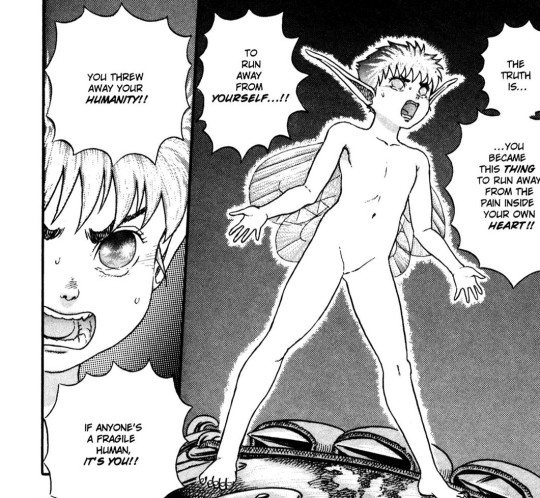
(Chapter 4, “Guardians of Desire”)
As Puck says here, apostles are very much still fragile humans. The most fragile, in fact. Their deformed bodies are proof of their having broken themselves. The clearest demonstration of this is of course Griffith, who as an apostle became what he always hated. These are “fallen” people, unloved, hiding from themselves and from the world. If that’s not someone who is in need of mercy and redemption, I don’t know who is.
As to whether both Guts and Griffith still need to “pay,” narratively and morally, for their actions, this is not something I have a strong personal opinion about – I think both of them have already suffered hugely. That being said, I do think a second sacrifice narratively should lead to both of their deaths at the end of the story. That’s for two reasons, one because I think they both would both probably view death as a release more than anything, and two because it would function as the narrative consequence for their actions, especially if they were to get taken out by Apostle!Casca, who has also suffered hugely at the hands of both of these men.
Death would be what finally frees both Guts and Griffith from their pretty fucking miserable/doomed lives and would finally provide them some kind of peace as well as self-actualization – in that sense Casca’s actions could be read in the mode of both mercy and vengeance. So that’s why I lean in that direction, but then again I’ve always been more interested in mercy/forgiveness/redemption as story tropes than revenge/punishment, though I think the story was set up to be able to balance both in a really interesting way.
Anyway, I hope you enjoyed my senseless ramblings. If I had my druthers this is how the story would have ended, and I guess it gets to live in my headcanon forever, and maybe yours too if you like my interpretation of the story.
Sorry for any of you who were waiting for another post from me – the news of Miura’s death really kept me from thinking about Berserk for a while, for obvious reasons. But the story is what we make of it, especially now, so I hope this maybe gave you a bit of solace too.
As always, feedback, discussion, etc. is welcome.
#since it's all fanon now i figured why not throw my hat in the ring#yes im hating the continuation series#also I've been sitting on this post for literal years#how did that happen seriously wtf#this post has been about gay stuff#as per usual#berserk#berserkmeta#berserk meta#griffith#griffith meta#and even some#guts meta#!!!#im really branching out
115 notes
·
View notes
Text
In episode 22, where Guts' famous campfire of dreams quote comes from, Guts and Casca were surrounded by hundreds of little lights in the sky and on the ground. Guts was pondering about how everyone out there had their own hopes and dreams, no matter how small, and they were ready to stake their lives on them.
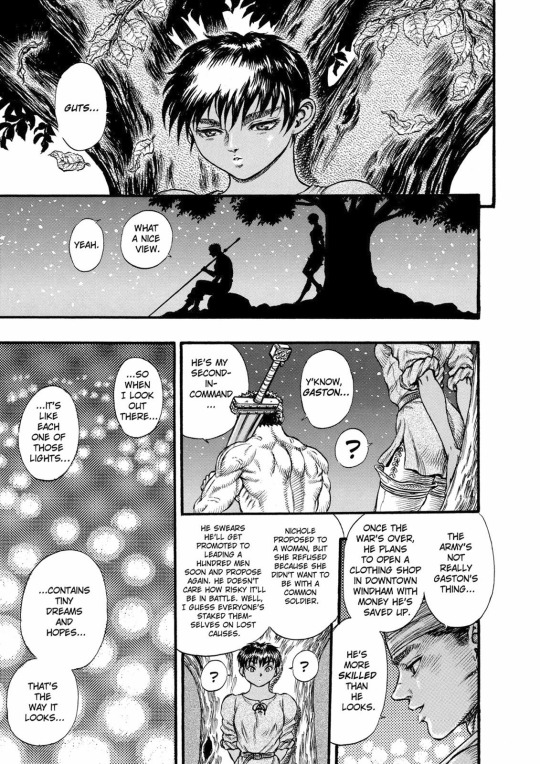

In episode 90, after the sacrifice, there is only one large light source in the starless sky - like Griffith's dream that devoured all the others.

Earlier, in episode 17, Griffith was shown to be somber at the thought that it was his dream that killed a 10-year-old boy. But it should not be forgotten that if he refused to take him in, this boy who wanted to become a soldier would simply join another group of mercenaries.

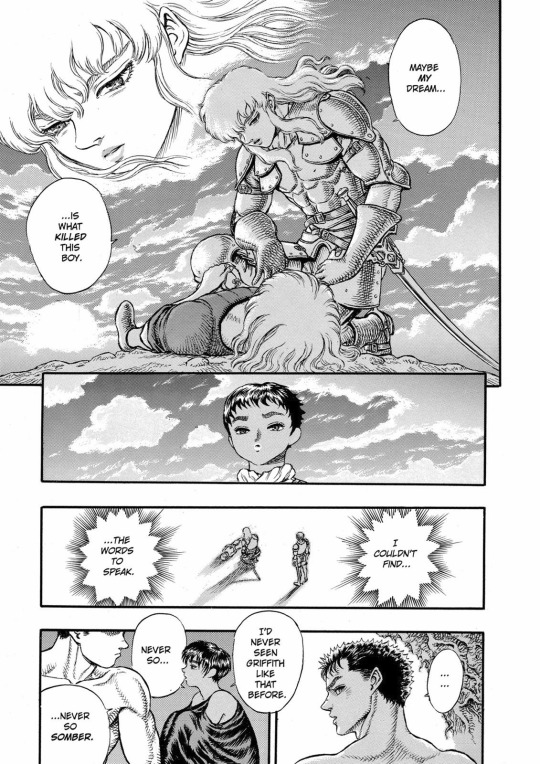
Episode 77 further reveals Griffith's way of thinking: all those who fought under his banner did so because they wanted to become a permanent part of his domain and were all about his dream. Almost all of Ubik & Conrad's gaslighting revolved around this. For Griffith, the BotF's exploits were just a sad, bloody, and dirty path to get where he wanted to go (whereas the Band of the Falcon ended the century-long conflict), and the only way to make it not be in vain is to metaphorically take the dead band members to the castle.


It honestly never occured to him that it wasn't all about him. Apparently, when he closes his eyes, it becomes dark for everyone.
6 notes
·
View notes
Text
Gats(Berserk,1997)


#berserk#gatsu#fanart#digital drawing#digital illustration#art#artists on tumblr#digital portrait#berserk anime#berserk manga#berserk meta
1 note
·
View note
Text
guts and griffith obviously have different types of moral compasses and while the view that "guts is better and more moral than griffith" is seriously reductive and flattens both their characters, i do think it's interesting to contrast their morality. like, to me, griffith's moral compass seems more abstract and all-encompassing, while guts' seems more individualistic and limited in scope. i don't think guts would have made the choice that griffith did during the eclipse, but a part of that is because while griffith feels the weight of the lives lost in pursuit of his dream, guts wouldn't - not as much at least. before guts leaves the band of the hawk, it's griffith who asks guts if he thinks he's cruel, and it's guts who dismisses the question as "this is just what you have to do for your dream"; griffith is the one concerned about the morality of cold-blooded murder while guts is the one who shrugs his shoulders about it.
one factor (among the many, many factors) in griffith's decision to sacrifice the band of the hawk was that he felt he owed the people who had died for his dream, enemies included as well as comrades. the former he cut down because they were in the way and the latter fought for him and lost their lives helping him get closer to his goal. he feels obligated to make something out of their deaths, which he believes, somewhat subconsciously, that he is responsible for. at that point in the story he's become helpless, powerless, totally dependent on others, and unable to pursue his dream further unless he chooses to make the sacrifice. if he stops here, then all those people will have died for nothing. his decision during the eclipse is partially driven by guilt. it's "i've come too far and i can't let all the lives of the people i killed go to waste."
and i don't think guts would feel that same weight? guts' morality seems way narrower in scope than griffith's. he doesn't care quite as much about the people who die as a consequence of being in his path; instead his main concern is the handful of people he loves and cares about. and don't get me wrong, when you are one of those people, guts would force his body to the brink and fight until it breaks apart before he lets you get hurt. (that's part of why i love the fact that he's represented by an absolutely unhinged and feral doglike beast.) but outside of that handful of people, or unless he's dealing with a kid, the number of fucks he gives drops pretty drastically. again, he's the one who cheerfully patted griffith on the shoulder after he carried out the murder that griffith ordered him to. he's pretty blasé about taking lives and being responsible for people's deaths as long as these people are unrelated to him, more so than griffith pre-eclipse.
this isn't to say that either of their moral compasses are superior to each other's, they're just different. they put a different amount of weight into things. but again, i do feel like diminishing it to simply "guts wouldn't sacrifice the people he cares about while griffith did and that's why guts is a better person than griffith" is a bit of a disservice to the narrative.
#berserk meta#berserk#griffguts#griffith#griffith berserk#berserk griffith#guts#guts berserk#berserk guts#berserk tag#berserk rambling#kentaro miura#miura kentaro#i ramble
261 notes
·
View notes
Text
analyzing kentaro miura’s words on casca’s recovery
Below I’ve attached three separate screenshots of translations of a 2019 interview done by Young Animal ZERO magazine with Kentaro Miura on the topic of Casca’s recovery and revival. These aren’t new of course, but I want to discuss my reaction to them, and also discuss how I think they fit in with the current direction the story has taken with Studio Gaga’s chapters.
First up, a fan translation originally from skullknight.net, reposted to twitter:

Up next, a google translated version from kojion on twitter, who’s provided a few interviews that haven’t yet reached English speaking fans:
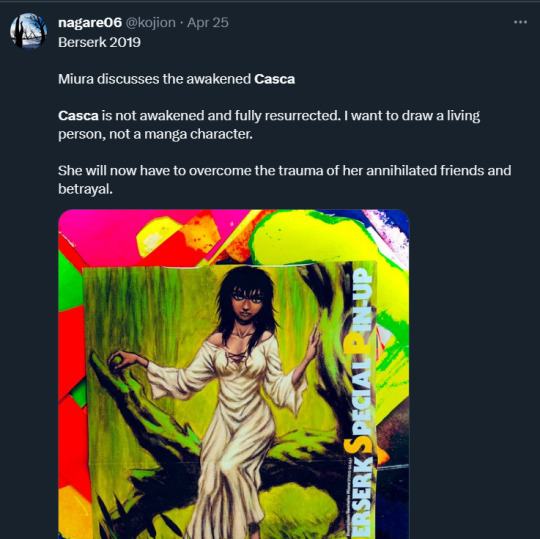
Finally, I’m not 100% sure what this is. It seems to follow from the above screenshots, but it’s not clear if this is just kojion’s interpretation of the interview response, or if this is specifically something Kentaro Miura said. I messaged him on twitter to ask, and I’ll update this post accordingly with his response!


This interview response was, no exaggeration, like a balm on my soul to read the first time I saw it. With how prevalent rape is in Berserk, and with how long it took for Casca to be revived, I admit I couldn’t help falling into this pit of frustration where I wondered if Miura even knew the extent of how awful what he put her through was. Her mental state, of course, did indicate he was aware of that - and then her revival happened, and the corridor of dreams, and I just remember being in actual tears because of how we went into Casca’s mind to show the trauma from her eyes. I can’t think of a more effective way to show something as serious as rape, genuinely.
And then, of course, this interview response, and again I remember thinking: Wow. This author really gets it. It was the thing that really made me confident in his ability to tell the story of Casca’s recovery.
First up, the very first part of the response: Casca’s awakening is not the end of her journey, it’s the beginning. This is absolutely, incredibly realistic. I think Miura likes to tease the audience in a sort of mean way lol, there’s the beautiful, dramatic panels where Casca awakens, and she’s put in that gorgeous fairy dress - almost like a wedding dress, you could say - and she’s sent off to have her romantic reunion with Guts...
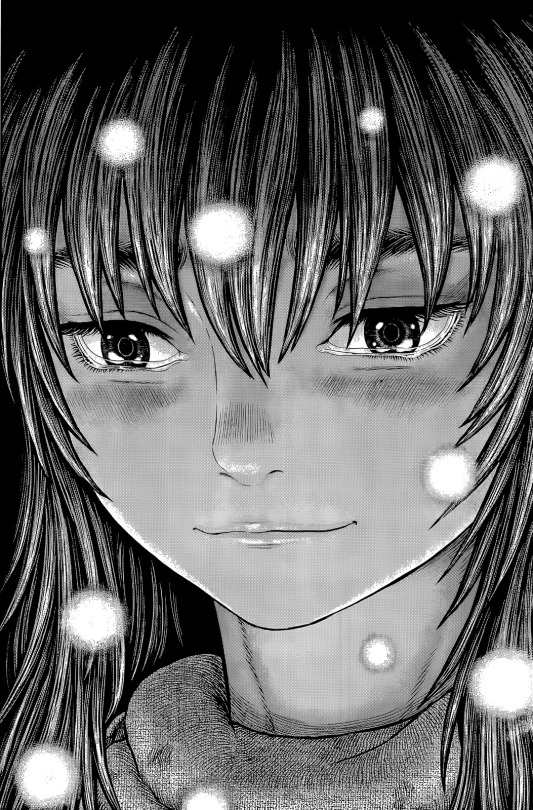

And lol. We all remember how that went. Miura is such a troll lmao (affectionate)(kind of).
But of course, just because she’s in control of her mind again doesn’t at ALL mean she’s processed her trauma. Guts has had years to process what happened, but she’s been completely stuck this whole time.
We know from her dreamscape that it was Griffith’s betrayal that really, truly broke her mind (I won’t include the panels here because I don’t want to CRY), and that sort of loss of trust is in no way mended by simply returning to herself. Again, then, two things that made me so astonishingly confident in Miura’s ability to tell Casca’s story from the interview: He's writing Casca as a human, who will react in a natural, human way to her trauma, and that she needs to face up to what Griffith did. This, to me, very clearly indicates that her upcoming arc is going to be focused on facing up to the trauma Griffith caused her, and this is especially hammered in by what’s happening to her currently in canon, being stuck in Falconia with Griffith and with her memories, again, magically suppressed so she can’t begin to process anything. I genuinely can’t imagine any other way for things to go for her.
One more note before I go on to my ~predictions~ based on the current chapters is that I want to highlight this panel here:

If you follow me on twt you’ve seen me say this before but PTSD flashbacks have the person not just remembering the traumatic event, but feeling as though they’re experiencing the traumatic event all over again. Miura is aware that Casca simply regaining her memories wouldn’t be the end of her recovery but the beginning, knows that the real key to healing is processing the traumatic event, and knows that PTSD flashbacks make you feel as though you’re experiencing the trauma all over again. It’s far more sensitive than I’d expect most authors, let alone a cishet dude mangaka lol.
SO WHAT DOES THIS MEAN FOR CASCA?
I need to admit I’m making this post because earlier I got into a conversation on tumblr with someone who claimed that people read too much into Miura’s comments on Casca’s recovery, that they don’t indicate that she’ll successfully heal, that there’s no indication from the comments that he intended to write a full deep dive into Casca’s mental state and trauma, and that for all we know this would just be a side plot a la Farnese’s growth.
My position is that I genuinely can’t think of anything else that Casca’s upcoming storyline could be about besides her struggling with her trauma (and of course trying to escape Falconia, but in my mind those go hand in hand). I also think that I simply have different ideas about how important Casca is narratively than this person, which is the root of our difference in opinion on Casca’s recovery.
Right now, Casca has been kidnapped by Griffith and taken to Falconia, where she is being magically drugged to suppress her memories, and her healing. Her storyline necessitates that she get away from Griffith and out from the spell currently suppressing her personality, and getting out from under this spell will mean the return of the memories she was starting to process in Elfheim.
While it’s terrifying that Casca is away from her support system (and has been kidnapped by her RAPIST jesus christ) I actually think being away from Guts is the necessary key to her processing Griffith’s rape on her own terms. Guts is a massive trigger for her PTSD currently, and there’s the duality of her desire to see him and the likely ensuing guilt and frustration and sadness that comes with being unable to. Without his presence around her, I actually think it’ll be easier for her because there won’t be an expectation of her being with him.
There are people who we KNOW are in Falconia and will likely be Casca’s support system, we just currently have no idea how they’ll all meet up. I know Luca and the girls will be instrumental to Casca’s story because otherwise there would be no reason to bring them back and also for Casca to mention them explicitly in Elfheim.
The other point made by this person on tumblr is that Miura’s interview doesn’t indicate that Casca will recover. Perhaps, they say, her story will end with Casca unable to cope. I think this in people’s minds leads easily into the Apostle Casca theory, which I’ll be honest and repeat that I fucking hate so much LOL. I get it in some sense, but I really do hate it as a theory. As Miura says, though, he’s writing Casca as a real person, and there are absolutely very low points in trauma recovery, so I expect her to go through a lot of strife.
It’s difficult in some ways to look at these responses because there’s the language barrier. “she should confront what Griffith or the monsters did” and “she will now have to overcome the trauma” both, to me, seem to positively indicate that overcome is the intended outcome, but of course I’m not sure. Now, if kojion’s second tweet is a translated quote from Miura himself and not just his analysis of it, that’s kind of a smoking gun that recovery is the intended outcome of Casca’s arc, but I’m not sure one way or another.
This is purely based on my emotional response, but I think a story where a woman is betrayed and raped by one of her closest companions, who loses her mind for years because she’s unable to cope with the trauma of the betrayal, who finally has her memories returned to her and now needs to go on the incredibly difficult and painful journey of processing this betrayal - to have her story end tragically with the result that she’s never able to recover would...
Hm. Let’s say that it would need to be handled with extreme care. It might be the thing that gets Berserk to warrant its grimdark reputation.
As a conclusion, I think this one quote has a ton of potential for analysis inherent to it, particularly for fans of Casca, who are having a bit of a renaissance on twitter right now HAHA and I’m trying to gather them on tumblr too. If you combine it with various tidbits of Miura’s chapters from before his death, as well as the continuation by Studio Gaga, it helps create in my mind a decent picture of the trajectory of Casca’s arc, though the specifics are still up in the air.
Either way, I want to say to any Casca stans reading this that I really do think that Casca’s story is important, and will be shown as important going forward. I always hesitate to trust cishet authors for obvious reasons lol, but at least I can say that if she’s shown to NOT be important, that will entirely be on him and his sexism, and I think it will inherently make the story weaker. I don’t think that will be the case, though.
WE’VE WAITED THIS FUCKING LONG-
226 notes
·
View notes
Text
my favorite thing ever is taking media that's notoriously liked by the worst genre of incel dudebro fans and rubbing my nasty transexual hands all over it. reclaiming media one subreddit at a time. male twitter users with love live pfps fear me.
#i got a whole collection going#jjba#berserk#batman#dc comics#neon genesis evangelion#there are more I'm forgetting#anon yells about stuff#meta#fandom#queer media
54 notes
·
View notes
Text
What Guts is for Griffith
a dispassionate analysis written for a better understanding of both characters and of Berserk
Part 4: Why Charlotte?
I have so many things to say about princess Charlotte. It would be easy to write her off as a secondary character, indispensable for the plot to advance: the woman who comes between Griffith and Casca, between Griffith and Guts, and the woman Griffith commits treason for sleeping with. But it is possible that Miura has given us something more about her that we dismiss because, let’s be real, we have a habit to dismiss characters that have an abundance of feminine traits, that are gentle and soft spoken and wear beautiful dresses. We criticize female characters more harshly, we certainly give more praise to the depiction of strong or competent women, or I should say, women that act like men, that show more masculine traits - but still offer to the view their pleasant feminine forms. That’s part of the generalized dismissal of feminine qualities as something secondary, ornamental and frivolous: contempt for the weak and disdain for women, femininity and non-standard expressions of sexuality and gender are traits of the culture of machismo still prevalent today. And I will talk about how Casca isn’t just that strong woman type either, but one thing at the time. So Charlotte first. Charlotte can be feminine, she doesn’t need physical strength and fighting abilities: as a princess, she has the privilege of being recognized as someone who matters already. What I appreciate are the subtleties and the details behind the cliches. And the cliches are there, she is a princess, she is to be a romantic interest: she stumbles and Griffith has to catch her, her horse is spooked and Griffith has to save her. But she isn’t the unassuming character that we see on the surface. Certainly sheltered and mostly innocent and not aware of the reality of the common people in Midland, Charlotte hasn’t been blind to the things that surround her. Midland has been involved in a hundred years' war that preoccupies the men around her, her father, her uncle the supreme general, and the talks of the nobility and the political machinations revolve around the war. She isn’t cheerful and carefree, she is asking questions about the purpose of that violence. When she is approached by Griffith at the hunt or at the Royal ball, she is initially somber and a little gloomy, bothered by the intrinsic violence of the hunt and by the fact that the ball and the festivities only try to “divert everyone’s attention in the castle even but a trifle from the weariness of the war”. In both cases, Griffith is the one who cheers her up for a while. And he paid attention to the questions she asked, bringing back the topic when they are alone. He has been thinking about what has been driving him to violence too, pondering about war and the senseless deaths of his soldiers: “Martyrdom for a merciless god. What a waste. On the battlefield, the life of a common soldier isn’t even worth a single piece of silver”.

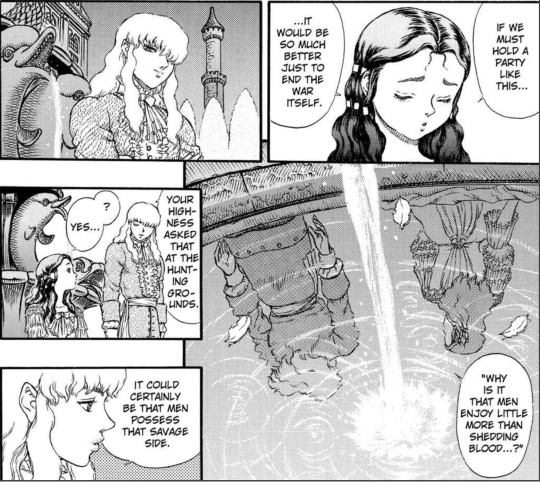
With Charlotte, like he tried to do with Guts, Griffith is able to talk openly about his thoughts. Griffith fits with the princess, he enjoys talking to her in those idealistic and philosophical terms, he has been educating himself not only to achieve his ambitions, but for pleasure also, he collected books and read extensively on things that aren’t all only useful to his goals. Those are things he can’t share with his soldiers and companions. He simultaneously has a burning need to reach the highest place in society in terms of power, and he strives for the betterment of his life and those lives and those deaths he cares about, those of the commoners who followed him in battle, those he is indebted to.
Griffith’s connection to Charlotte is surprising, he has paid attention to her behind what is in his interest only, behind the performance of the seduction. Once I understood it this way, it didn’t seem strange anymore then he went to her when he was wounded by Guts. Casca has been too emotionally dependent for Griffith to be able to weigh on her, or to seek her out when he needs support for himself. He feels too much that his role with Casca is to be the strong one, whenever she is trembling, because he feels responsible for her. If he falters, what would become of her? With Guts gone, Griffith only has Charlotte left.
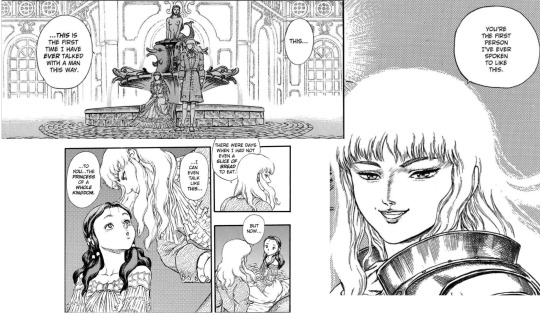
The Griffith who talks to Charlotte about dreams is the same Griffith who first talked to Guys about striving to know what is his place in the world: “That’s what I want to know! What is my place in the world? Who am I? What am I capable of? What am I destined for? It’s funny… you’re the first person I’ve ever spoken to like this”. Between Charlotte and Guts, the one who has been feeling intimidated is Guts. Charlotte accepts Griffith and makes some thoughtful observations about him: “Lord Griffith… you are a wondrous person. When I heard that you were common-born, it was very difficult to believe. Somehow… it is as if… you are nobler than any of the nobles in this castle (1). But, at the hunt when you taught me how to sound the reef whistle, you seemed very… simple and carefree (2). You were just like some village child used to playing in forests and rivers… and right now… you say the kinds of things a philosopher would say (3)”.
Charlotte doesn’t fall in love with Griffith because of how he looks or because of his heroic performances in the war, she is seeing him like maybe only Casca did, but she is also able to share with him the same sense of weariness and disdain for most of the nobles (1), the same innocent and childlike side (2) and the same interest to look at things like philosophers would do (3). It is this exchange with a person like Charlotte that brings along the discussion about friendship: “I imagine all of your friends, too… must have come so far with you, attracted by that charm”. Before speaking, Griffith’s looking down. Charm and charisma, he knows that those are the things that let him have a hold on people. But it has been bothering him, because that charm is also blinding others and keeping them from seeing the other characteristics of Griffith’s personality or his feelings. “They are… excellent troops. Together we have faced death so many times. They are my valuable comrades, devoting themselves to the dream I envision. …But… to me, a friend is… someone who would never depend upon another’s dream… Someone who wouldn’t be compelled by anyone, but would determine and pursue his own reason to live… And should anyone trample that dream, he would oppose him body and soul… even if the threat were me myself… What I think a friend is… is one… who is my equal”.
Even after listening to this, Casca is still determined to be a silent and strong presence at Griffith’s side, his “sword”, but she missed the implications of him saying “someone who would never depend upon another’s dream”, she says: “I want to be at his side. I want to be something he can’t do without in achieving his dream”. Regardless of his undoubted ambitions, Griffith feels that he has a duty to follow his dream for the sake of others, to give a meaning to the numerous deaths under his command, and to give a purpose and a sense of achievement to those who are still alive: “A man should envision such a lifetime once. A life spent as a martyr to the god named dream…” is the conclusion of a speech that started with: “For no other’s sake. To accomplish it for him… for himself. A dream”. It is a conclusion that is contradictory to his premise and reveals a disconnect between what Griffith is saying and what he is feeling. There is a thread of irrationality that is looming dangerously on him. He shoulders all the responsibility and the burden that comes with his ambitions and with war. A friend would look past Griffith’s charisma and his goals: “someone who wouldn’t be compelled by anyone, but would determine and pursue his own reason to live”.
Griffith’s desire to be challenged hides his need to find a compromise between following a dream that is too big for him, for a sense of duty and responsibility, and being himself, a confident young man who wanted to know what his place was in the world and wouldn’t accept to live his life passively, but doesn’t have that absolute conviction or lack of self doubt and insecurities.
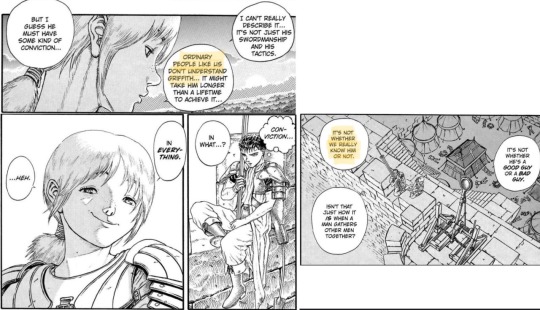
Guts is shattered by those words, because he never had the chance to think in those terms, having learned only how to survive the brutality of a mercenary life. Because he has been approaching his relationship with Griffith like he was with Gambino, Guts thinks that he has to gain attention, respect and affection, he has to prove that he meets some requirements. As a consequence of this conviction, he takes Griffith’s speech at face value, like a life lesson and mission. And he will be unable to look further, behind those words, to the times Griffith talked to him, acted recklessly for Guts’s sake, to all the signs that Griffith has relayed on Guts emotionally, the fond memories of their first duel that Griffith treasured, the soft spot that Guts occupies.
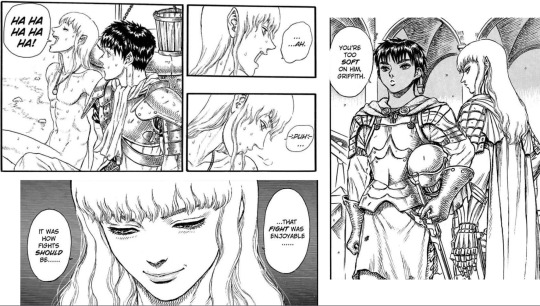
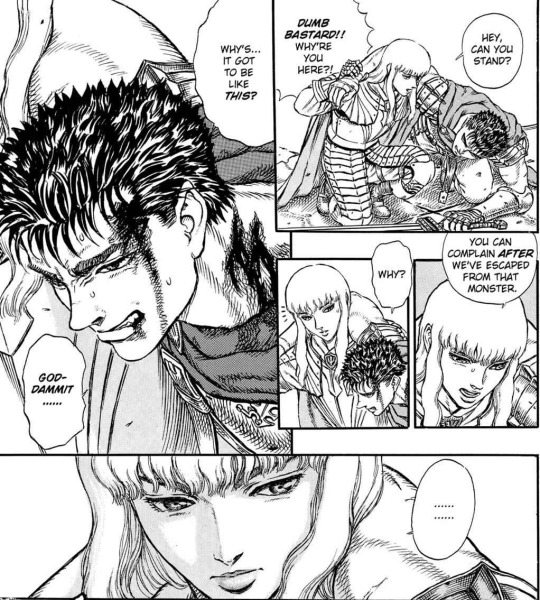
There is evidently a hard side to Griffith, he has been having success so far because of his confidence: “That is how I have achieved everything so far”. The sheer satisfaction he shows when he learns that Julius is dead and Adonis too is undisputable. Adonis’s death wasn’t part of the plan but it is extremely lucky in connection with the deepening of Griffith’s relationship with Charlotte, because Adonis was expected to marry her once he was older. That “luck”, those coincidences and incidents that continue to happen since the appearance of Zodd, arguably since Griffith acquired the beherit, are tied to an irrational force or to whatever causality that is pushing towards a certain direction, without none of our characters being the wiser. Griffith met Charlotte under those ambiguous auspices. But at the same time, Griffith really bonded with Charlotte, there is a sincerity to it. And there is sincerity and emotional depth in his personality, the darker traits intertwined with lighter and quite candid qualities. To become what the Godhand asks of him, he will need to be thrown into the deepest darkness and loneliness: “I’m sinking… farther from the light. Where?” And then: “The crystallization of your last tear shed. When suffering so profound as to make someone rip himself apart is confronted… a heart is frozen”.
More about Griffith and Charlotte on a later date.

#berserk#berserk manga#berserk meta#griffith#griffith x charlotte#guts berserk#beherit is a better transliteration than behelit#manga analysis#eri reads berserk#charlotte
64 notes
·
View notes
Text
Rambles about the Millennium Falcon Arc Part 1
I said I wasn’t going to do this one next, but I changed my mind because it’s Valentine’s Day.
So, it’s probably not surprising that this is one of the bits I’ve been looking forward to tackling the most. I am a predictable goldfish. Despite that, I did kind of wonder what I’d actually have to say since I always felt like it’s a fairly straightforward section, so let’s see how it goes.
Later addition: I couldn’t shut up.
Rambles about the Millennium Falcon Arc Part 1
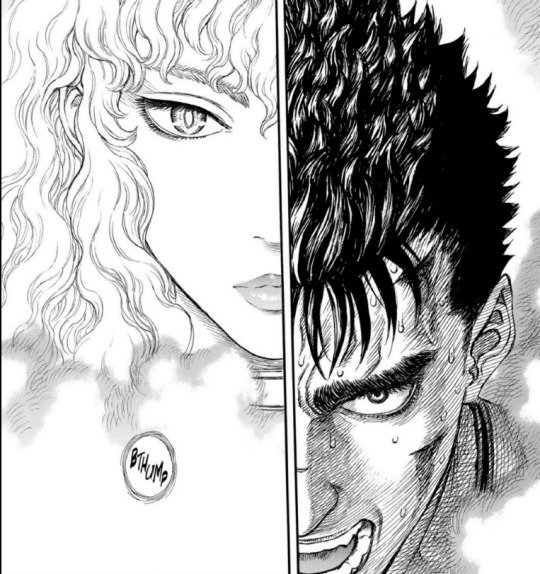

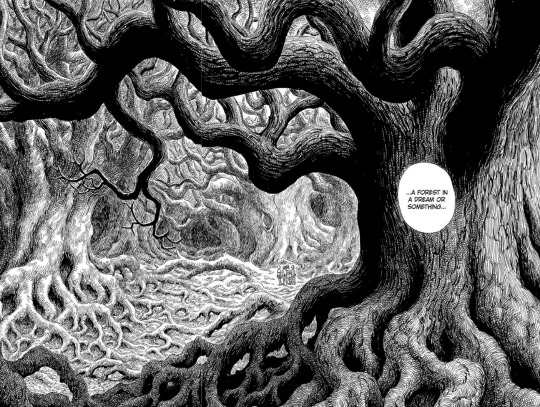
1. This opening reminds me of the beginning of the Last Unicorn. It’s not actually the same at all but it still reminds me of it - this dreamlike enchanted forest with creatures just outside the edge of your vision. People discussing whether those things are really there...I think about this a lot -the way the shadows and silences in the world post-Conviction aren’t really empty anymore. THAT reminds me of the unforgiven demon spirits that came to Griffith in the dungeon.
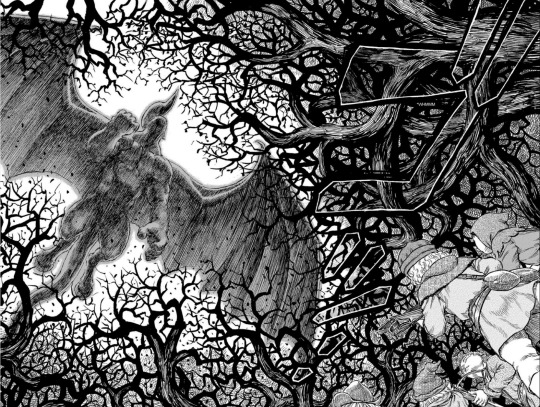
But it’s kind of interesting how Zodd went centuries without people seeing his apostle form (well I assume he killed most of the people who did) and suddenly he’s being quite brazen which I think speaks to the way the world is changing and the new set of rules that Griffith is bringing with him. He’s about to bring all the things in the shadows into the light, so the drive to discretion has faded out a bit.
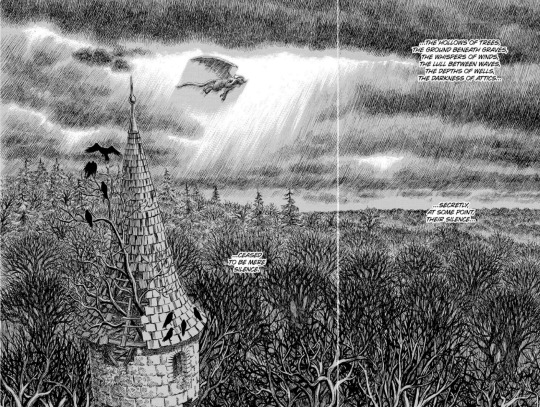

The hollows of trees, the ground beneath graves, the whispers of winds, the lull between waves, the depths of wells, the darkness of attics... secretly, at some point their silence ceased to be mere silence. Like a folk tale told by elders to children, as if it might have been there all along, something surely breathed within the silence.
One of the things that doesn’t get talked about a lot when discussing how Griffith is a dick for bringing the monsters and such back into the world is that per the discussion in Elfhelm, the world he created was really recreated – it’s the world that existed before humans lost faith in the supernatural and started to drive those things into the astral plane. And also, because of the way Berserk’s worldbuilding works, where the physical world and the astral world kind of overlap with some things (e.g. the tree in Flora’s forest) existing in one but not the other, the above passage is very relevant.
“As if it might have been there all along, something surely breathed within the silence.”
I mean they were there all along. They were just a step removed from where humans were, and so they couldn’t be perceived by those who exist wholly on the physical plane.


2. I think I paid less attention to Casca in the past than I have been this time... because she’s just kind of off in the corner doing kooky things most of the time. She does have a bit more characterization than I remembered – I guess it’s basically age regression since she acts kind of like a toddler or something. I... am not gonna get too much into Casca’s situation right now since obviously the main event is Griffith showing up like a ex with a glow up but her situation is on my mind a lot. Maybe I’ll get into it when she and Guts go off alone.

And I still miss Godo. Gruff old bastard.
This next little sequence I’m just going to rearrange slightly to make it easier to comment – you’ve all seen it anyway. I just moved the two panels of Guts thinking about Griffith out of the way of bit with Erica trying to get him to stay.
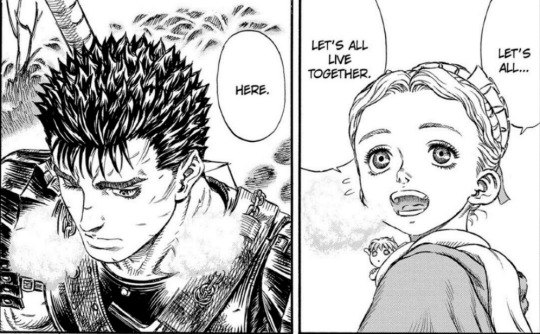

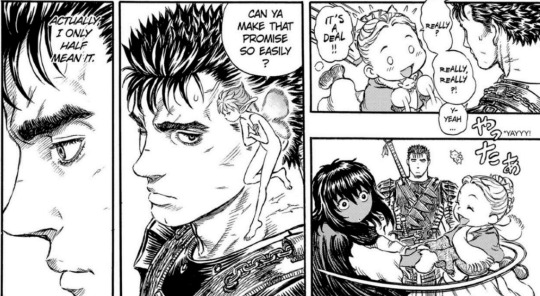
This is a kind of weird moment to me because Guts didn’t actually promise to stay he just half-heartedly acknowledged that if he did stay Casca would probably calm down a lot. I have a lot of conflicted thoughts about Erica and her constant push to have Guts stay with her/them, because Guts literally only knew them for a year so I’m not sure why she feels like he’s supposed to live the rest of his life with her.
I guess the real answer is “because she’s a kid. “
But even so, that moment kind of has the feel to me of like... Guts saying something kind of vague to avoid having to decide in that moment, but since he’s talking to a literal child it ends up being taken to heart in a way that’s difficult to walk back.


3. One of the problems I have with the “Guts just hates Griffith and wants him dead” crowd is... when he thinks about Griffith it’s never about killing him. He thinks about maybe becoming a monster to be more like Griffith. He thinks about Griffith’s flowing silvery hair. He thinks about how much he should want to kill him even though his instinct was to drop it. He thinks about abusing or abandoning Casca to get closer to him, or become more entwined with him or chase him, but he never... imagines inflicting violence on Griffith. He doesn’t fantasize about Griffith’s death, that’s just his fans. Guts himself can’t even bring himself to think the words, most of the time.
What I really think is happening, and I will defend this to my death, is...
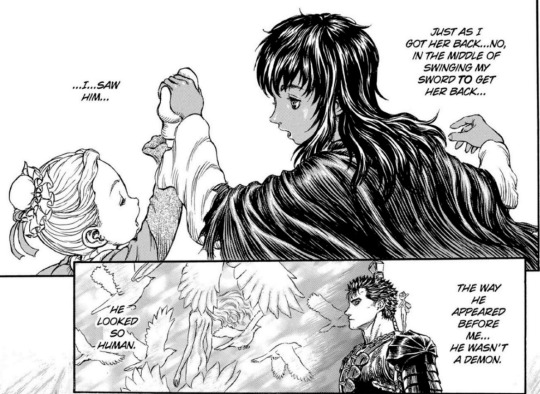
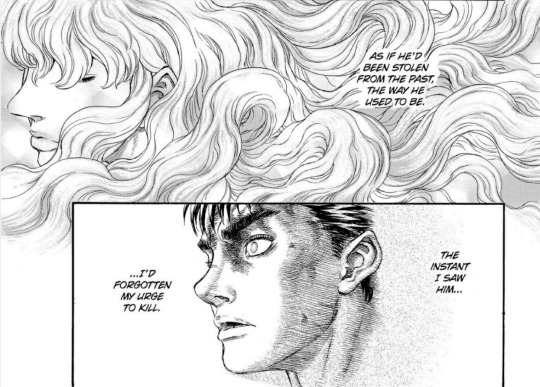
... what he really wants is for Griffith to be Griffith again. He wants to be able to get back the things he lost without realizing he had them. But it doesn’t matter because Griffith’s still a demon and Guts can’t turn back time, so he just gets mad instead, because that’s what he knows how to handle. As Godo said, he runs into his rage because it’s easier to handle than his grief – over the death of the Hawks and the loss of Casca’s sanity, but most of all over the loss of Griffith, the person he upended his life to get closer to – the person who no longer exists.
Which is why seeing Griffith in a human-esque body throws him off. It’s easier to hate Femto, who is visibly demonic and has obvious physical markers to separate him from the person who was, and is, Guts’ primary fixation in life. But when he looks like himself, that line gets blurry and Guts responds with epic ambivalence... as is about to play out during their meeting.
All that aside, the fact that his first instinct is to drop it is very telling, in my opinion. Because a person doesn’t need to talk themselves into doing something they unambiguously want to do, they need to talk themselves into doing things they feel ambivalent about, or conflicted about. On one hand they may want to do the thing, but on the other hand, definitely don’t want to do the thing. It’s like when you don’t want to go somewhere but you know you should, and you assume you’ll be glad you did it after it’s done, but in the moment you’d rather just watch tv and doomscroll, so you have to get yourself revved up to put on pants and leave the house.
I guess my point is...

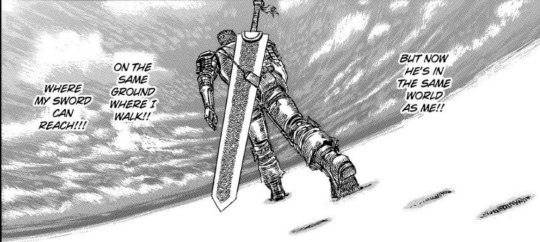
After he sees Griffith in his human form, the desire to go after him changes. He feels like he should do it for a number of reasons. Because of everything Griffith did, and how outraged and hurt he is. Because of his grief and frustration... and because he’s been hunting Griffith for years and there’s no way he can just stop now right when he finally has a chance to accomplish his goal. There is a bit of sunk costs in there - something Griffith knows well - mixed in with that genuine drive and anger, and hate.
But... as much as he knows that, as angry and hurt as he genuinely is, he struggles to hold onto that in the face of the one person who has always meant the most to him – for good or ill.
I do think that changes a bit, mostly as a result of this very meeting, but it never does go back to the way it was – the certainty he gained from all that black fire and white hot rage is dimmed by his ambivalence.
That said, even when he was faced with Femto his feelings were more complicated than that. Puck lampshaded it obviously, but even more than that you can see a slightly smaller scale version of the following scene all the way back in Black Swordsman –
Guts being crushed by Griffith’s initial dismissal of him. (He even does that thing where Griffith dismisses him and he’s like, ...WHAT WAIT... and tries to follow him), Guts being like, “Griffith you fucker, look what you did,” and Femto being all, “Hey Guts, I’ve got some good news: I don’t care,” and Guts being driven by Griffith’s lack of fucks to give... more than anything else, really.
So, you know, the change in appearance puts a foot on the scale but it didn’t create the issue to begin with.
Oh yeah. The other thing I wanted to say, because I’ve been thinking about it since the last writeup, is...
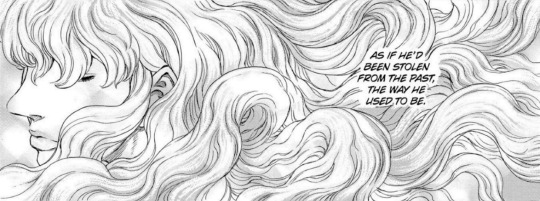
The fact that Guts perceives Griffith’s facetuned 2.0 – the version people recognize as being a tier above even the high tier of beauty that he already had as a human being – as “just like he used to be” is pretty telling as far as the way Griffith is in Guts’ mind: filtered through the eyes of love and idealization and hero worship, seen from the ground as Guts looks up at the pedestal he always had Griffith on.
The sheer sensuality of the imagery is also... quite notable to me, especially in light of some of the phrasing that has been discussed re: later scenes.

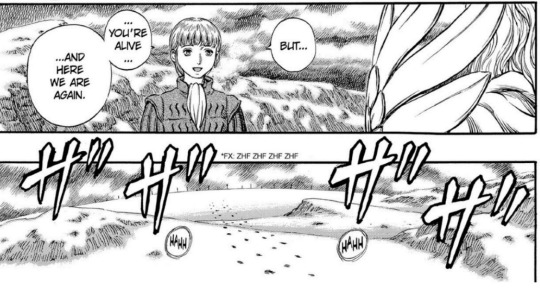
4. This whole part of the scene is so weird to me, honestly. Like the way Rickert is talking and Griffith’s just silent. It... gives me the weird impression of Rickert talking to a statue or something. Or a mirror. In some ways it’s actually pretty appropriate – Griffith was always the slate the Hawks projected their dreams and hopes and fantasies onto. The only one he really allowed to “know” him was Guts - even Casca picked it up by chance, really - so it is perhaps appropriate that Guts is the first person he speaks to on panel. I also think this serves a narrative purpose, but more on that in a moment.
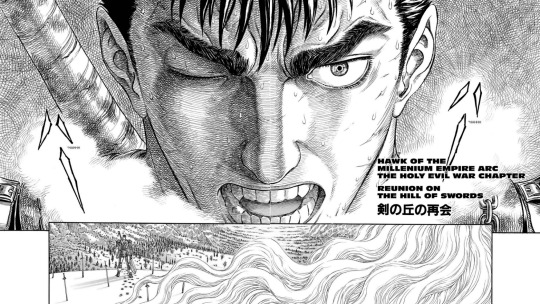
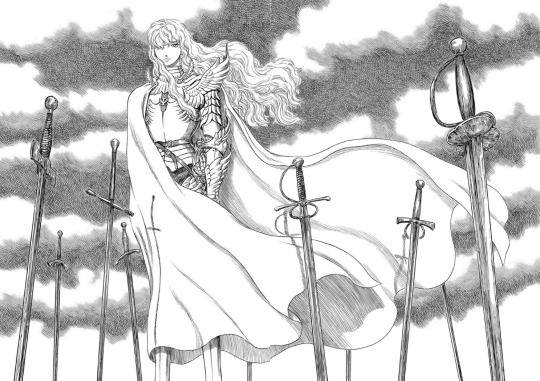
I bet the readers lost their fucking minds.
As a sidenote, I’m a little devastated that we lost the “reunion at/on/in” titling scheme for the Elfhelm visit. They did drop the phrasing on the color pages, but still.
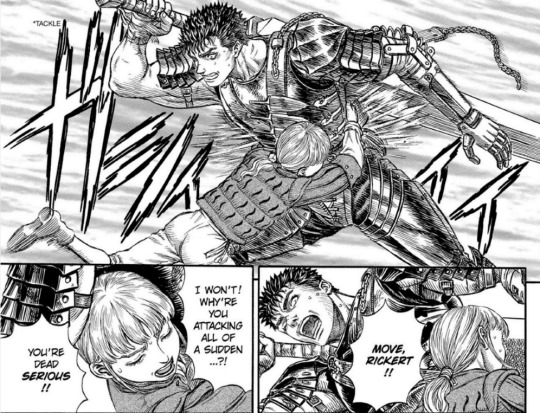
One time I read someone asking how Rickert was able to stop Guts given that Guts is definitely stronger than him and like... I just figured Guts didn’t want to trample him. Because it’s Rickert, I mean if it were anyone who wasn’t Rickert, Casca or Erica I’m sure he would have... well cut them in half if we’re being honest. But there’s no way he’d manhandle a Hawk that easily.
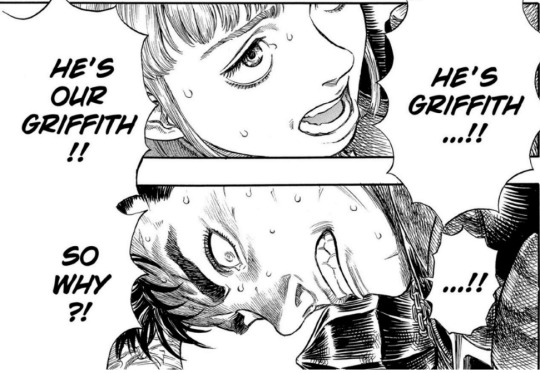

I can’t imagine how confusing that must be to Rickert. But again we see here this separation Guts has between Griffith as he is now and the Griffith he knew. Like he struggles to maintain it now because Griffith looks like Griffith, but he’s actively trying to maintain that separation... I imagine because it makes it easier to maintain his focus on vengeance instead of pining for what was lost.




In the deluxe version, that last panel is corrected to “Don’t talk about me in that same voice.”
Which is interesting – it kinda brings me back to exactly what Griffith’s talking about – the day they first met, when Griffith speed analyzed Guts’ personality and Guts was super pissed off about it (because he was right). And I do think that’s a lot of what’s going on here – “don’t talk to me in that same voice” and “don’t talk about me in that same voice” aren’t really the same thing. Well I’m sure you know that.
But basically, for me, when it was translated as “to” the feeling was something like, “don’t come here acting like you’re Griffith and using his face and smiling his smile and talking with his voice.” Almost like rage over the demon who replaced his friend.
With “about me” I feel more like he’s angry because this moment echoes the moment Griffith is talking about - when they first met, and Guts was a wild dog, and Griffith just stood there and analyzed him - and hes doing it again like nothing changed, but it has. It fucks with his head. I’m having a bit of a hard time articulating this for some reason, but look at Guts’ face when his internal monologue starts (“that same face”). He’s essentially frozen in place. He’s struggling. And just like back there on the tower, his first instinct is to stare and then he has to work himself up... in this case by the sheer hubris of Griffith showing up here all chill and acting like Griffith and pushing all of Guts’ emotional buttons.
It feels a bit like... “You’re acting like nothing’s changed, but everything’s changed.”

But it’s debatable how successful he is at revving himself up here. I mean he’s pissed, sure, but hes also just standing there. Rickert may be “holding him back” but in a page or two we see how effective that is if Guts really wants to get through, because Guts just shrugs him off basically.
As much as Guts is struggling with this situation, though, Griffith’s tone is interesting isn’t it? He’s so distanced and calm – even more than when they first met. Back then, he had a lot of intensity and playfulness whereas here he’s just kind of distant.
Once, years ago, someone told me that she had met up with an ex that she used to be crazy in love with... and she said she could still see everything about him that she had loved so much, but it had lost its hold on her. She didn’t ... react the same way to those things, even though the things hadn’t changed and she still thought they were charming.
That’s kind of the feeling I get from Griffith here. It’s not necessarily something specific to Guts though – it’s kind of how he is with everything, even his ambitions.
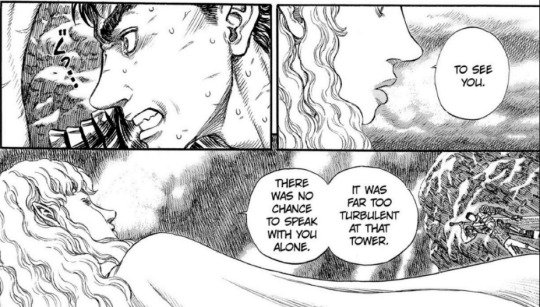

So like. About this scene.
Is he here just to see Guts and see whether Guts can shake his heart, or is he here to see whether he feels any guilt over the Eclipse?
Rhetorical question, it’s the first one. But I’ve seen a lot of people argue that rather than come here to see Guts specifically and test whether Guts specifically still affects him, he is instead here to see “The Hawks and their graves” and see whether he still “has some scrap of emotion left” or regrets his choices. And I don’t think it’s necessarily a bad faith argument - it’s almost the same thing, just phrased in a more... uh anti-Griffith way I guess and focused on the Hawks as a whole instead of Guts specifically. Usually this I think comes from people who place less weight on Griffith’s feelings for Guts than, say, I do.
But I’m going to argue against that perspective.
First of all, Griffith does literally say he came to meet with Guts. Maybe people think he’s talking to Guts and Rickert, but I don’t think that bears out from the scene itself. Remember when I noted that Guts is the first person Griffith speaks to on panel after his reincarnation? That’s a bit of a narrative trick – it drives home how focused he really is on Guts, because he’s sort of an ephemeral half-presence until Guts shows up and he starts solidifying so to speak. But that’s not all - Griffith really only talks to Guts at all for most of this scene – he only really acknowledges Rickert’s presence once he’s finished his business with Guts, and even then it’s half-afterthought as he’s taking off.
Second, Guts is the thing that always undermined Griffith’s control of himself and his ability or desire to focus on his vision/dream. This is obviously hammered home like 90,000 times during the Golden Age - that’s really what Griffith’s side of the narrative is about – this tug of war between Guts and Griffith’s lifelong ambition. Even when he actually made the Sacrifice, the only one he thought about before making the choice was Guts.
That being the case, the scene just makes the most sense as Griffith checking his Guts issues not his Hawks issues, because he doesn’t really have Hawks issues. If he wants to test his own heart, the best possible trial is coming face to face with this person that he desperately loved and couldn’t think clearly about. Because if Guts can’t hurt him anymore, can’t control his heart anymore, what could? Literally nothing.
There are also visual markers later but everything in its time.

And Guts’ face when he says that is priceless. He doesn’t know how to process that – he doesn’t know what to do with himself if that’s true. And honestly, imagine if Griffith had followed that up with, “as it turns out, this was a terrible idea and I miss them and I miss you.” Guts would have dropped the whole thing.
Don’t get me wrong, It’s not that I think Guts would be fine with it or suddenly not care that Griffith fed the Hawks to monsters and raped Casca. That’s not what I mean. I think he would have struggled with himself over it, and felt guilty about it, but ultimately I do think he would have dropped it.
Because the thing with Guts is that, since he operates on a system where whether he cares about what happens to someone depends on whether he personally likes them, he is always capable of letting something go if he likes you more than he likes the person or people you did something to. I once had a tierlist for this actually, but my position was basically that if someone at S tier hurts someone at A tier, Guts might not like it, but he’s able to let it go if you give him a good enough reason to do so. But if someone at B tier hurts someone at A tier, that’s when he can’t get over it. Basically, if you’re only hitting people he likes less than you, you can work it out even if it’s hard.
And this is relevant because despite many fans’ insistence, Griffith, not Casca, is the top dog of the tierlist. This is extremely evident by the way he lives, the way he prioritizes, the way his inner dog behaves. When he’s chasing Griffith he never thinks about how he should be there for Casca, but when he’s protecting Casca, he’s always twitching to go back to chasing Griffith. He physically and sexually assaulted her becausee he wanted to become closer to and more like Griffith. More on that when it comes up obviously but the point is...Griffith is the top of the tierlist. The only competition he’s ever had was Gambino, who is dead. And that being the case, I do think he would forgive Griffith if he had any reason to, any reason at all.
And if anyone thinks Guts is incapable of letting go of the Eclipse, i mean it was Miura himself who said if Casca weren’t with him, he’d eventually move on. That’s why Miura kept her around.
But even more than that, I do think that even more than the Eclipse itself, Guts’ rage and pain stems from the way Griffith doesn’t care about it, doesn’t regret it, wouldn’t take it back, dismisses it, dismisses him. Until the most recent meeting, that was always what set him off going back to the Black Swordsman arc and I... the most recent chapters aren’t by Miura. Like I appreciate the opportunity to find out where the story was going, and I accept the broad plot strokes as ‘true’ but obviously the details blur a little, or a lot.
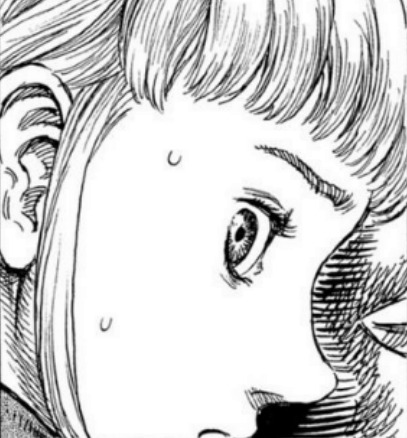
Another thing is, Rickert’s face. Rickert is aware that Griffith is talking about Guts specifically, because he’s aware that Griffith has always been weird about Guts – he’s right there with the others when Griffith found out that an immortal mega-warrior is about to confront Guts, and all the captains stopped what they were doing to watch Griffith for panic attacks.

He’s also the one who put it out there that Griffith’s self-destruction was probably about Guts’ departure:

But also... what Griffith says – I came to know for certain whether anything will shake my heart as I stand before you in this new body of flesh” – so the word he’s using that’s being translated as heart is kokoro and it’s a little more complicated than just heart, it’s like mind and spirit and emotions – I pulled this quote from here

So it’s interesting – I think in context heart is the right choice in English – certainly more accurate than something like ‘shake my spirit’ or whatever – but he’s talking about Guts’ potential to destabilize him mind and body, heart and soul - to shake him to the core. Which is not only an accurate explanation of Guts’ impact on Griffith pre-eclipse, it also explains the look on Rickert’s face. Because that’s a lot.
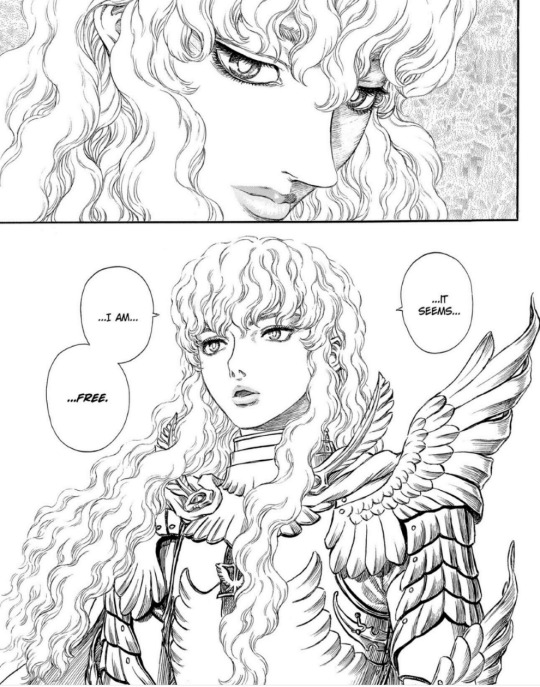
Also this page – the emphasis put on Griffith’s “freedom”, the prominence of the panel itself – it speaks to the reader’s assumed understanding of how much and how deeply Griffith had felt for Guts. Because it serves as the moment when the Griffith we knew – who perhaps the reader expected to see again now – is confirmed to be gone.
At least in theory.

The funny thing about it, though, is that while Rickert and the reader know that Griffith was basically obsessed with Guts, Guts doesn’t know that. So when he says he’s free (of the hold Guts had on him), Guts reacts to it as though he’s saying he’s free of guilt over the Hawks. Which in fairness I guess he probably is, but the point is Guts doesn’t really “get” what he’s saying, as usual.
Also, this is what I mean! I’m not saying he isn’t mad at Griffith regardless, but until Griffith blows him off, he’s letting himself be restrained by Rickert – there’s rage, but there’s also a little hesitation, and I think – in that moment when Griffith says he came to see whether he still cared – a bit of hope mixed in there, too. Hope that coming back to the world has brought back more of the person he was – that he won’t be a monster anymore. And it’s evident on his face – Miura was such a master of facial expressions – that’s not even really rage in that bottom panel its something of a plea – a desperation to find something in Griffith that he recognizes. It’s pain, and the need to have Griffith acknowledge that pain and have some kind of reaction to it.
To go back to the my-ex-doesn’t-affect-me-the-same-way metaphor, its like Guts is the ex in that equation and he was kind of hoping they could get back together, but nothing he says or does can make Griffith react to him the way he used to.
It reminds me of that quote from Miura about how Griffith brings out Gut’s will to fight, but also his loneliness.
Which brings us to this:

In all the discussion about whether Griffith has any feelings, it’s kind of odd how no one ever discusses that Griffith never actually said he didn’t have any feelings. Because the conversation was like
Griffith: I came to see whether you can still destabilize me, but as it turns out, no.
Guts: Are you saying you don’t feel anything about all that shit you did?
Griffith: All I’m saying is that I won’t betray my dream.That’s it, thats all I’m saying.
It’s a trap I I fall into as well – referring to his emotionlessness. To me though it’s always been more about having his feelings blunted than completely eliminated. In any event, it’s a bit of an evasion. Because he never says yes, exactly, I have zero feelings about you or anything else, he just implies that he is no longer controlled by whatever he has going on internally, if anything.
Which, if you think back to the bit above about Guts’ misunderstanding of Griffith’s point, makes the conversation a bit more interesting, because Griffith’s final comment – I won’t betray my dream, that’s all – becomes more of a direct statement about the power Guts has over him:
“Are you saying you don’t feel anything?”
“What I’m saying is that you’re not going to derail me again. That is all that I’m saying.”
And now some visual markers.


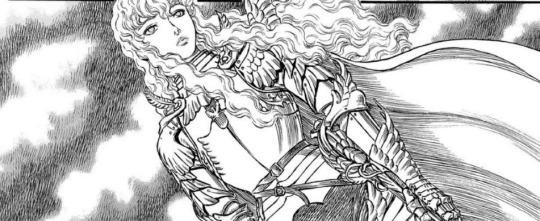

How does this series of images confirm that the scene is about Griffith and Guts not Griffith and the Hawks? Well, that’s why we keep going back to Griffith’s calm face while Guts fights for his life against Zodd. We remember the way Griffith reacted to Guts being danger, so his nonreaction serves as an indicator for how much he’s changed.
This is.... one of the things I think people lose when they think he’s a sociopath or a serial rapist or whatever, because Miura did the same thing with Femto’s rape of Casca – he established that Griffith has a history of protecting Casca from sexual assaults, or in the case of Wyald of wanting to so much that he damn near jumped into the fight despite being unable to walk or hold a sword. And while he does seemingly make some kind of move on her in the wagon, when she tells him to stop, he just stops. Yet, the first thing he does as Femto is rape her himself. It’s a narrative shout to the reader that things have changed – he’s changed. If you think he raped Charlotte and tried to rape Casca in the damn wagon you miss this point entirely and if you think Griffith didn’t care about Guts you miss what’s going on in this scene. It’s here to tell us that he’s changed. He’s empty now, he doesn’t care about anything – those boundaries that once confined him, those feelings that bound him, have no pull any longer. There’s literally no other reason to keep going back to that empty expression.
But, the thing is, much like his vague “I’ll not betray my dream,” which may or may not mean what Guts thinks it means, the look itself may be misleading, too. Because...

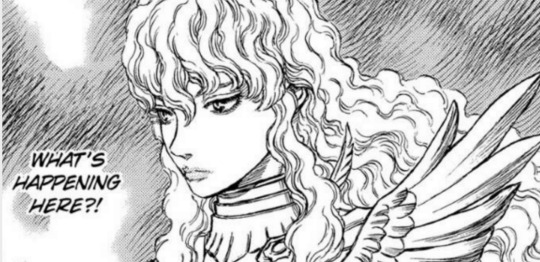
His dearth of expression is undercut as his face doesn’t change at all even after the story takes a moment to point out specifically that he does feel something. I’m not getting in deep into whether the feelings are his or the baby’s at this specific second because it doesn’t matter for my point which is that Griffith’s face doesn’t change even when he’s feeling some type of way, which means we never really know whether he is or isn’t.
As a sidenote, that actually isn’t too different from his human self, it’s just that back then he’d reach a point where the situation escalates too far and he starts sweating and bugging out. But at first he tended to be pretty stoic.

Which again seems to imply to me that the major change is in the intensity of emotion more than their existence or nonexistence. He reacts, but it never escalates.

Apropos of nothing, I love this panel. Geez Zodd. ...sometimes I wonder what makes some apostles look so bestial in their human form whereas some of them look completely human (e.g. Locus, Rosine, etc). I imagine it’s something to do with choosing their forms or temperament or whatever, but it’s an interesting question. I have so many questions about Apostles in general...
Anyway skipping the fight for the most part since it’s just like grunting and commentary from Rickert.
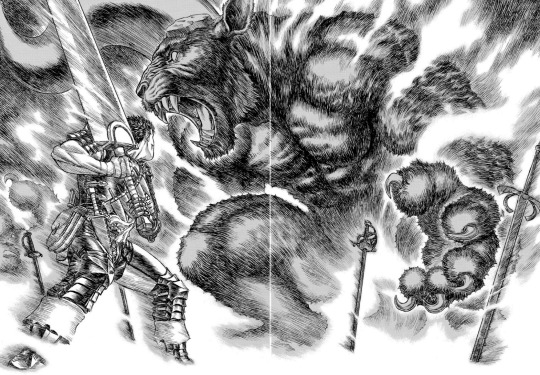
And this, which is one of my favorite images in the entire series.

There’s the famous “... ... ... ... ...” of significant silence as Griffith contemplates the meaning of his beating heart. And then....
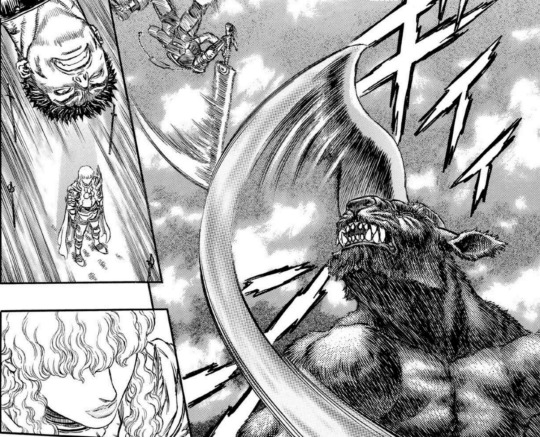
And the fact that something has changed in Griffith’s reaction gets highlighted covering his eyes with his hair – if you look over the way Miura portrayed his hair situation, you’ll find that he did a lot of covering Griffith’s eyes (usually one) with his hair in moments of internal struggle.
So here’s where Casca enters the story with...
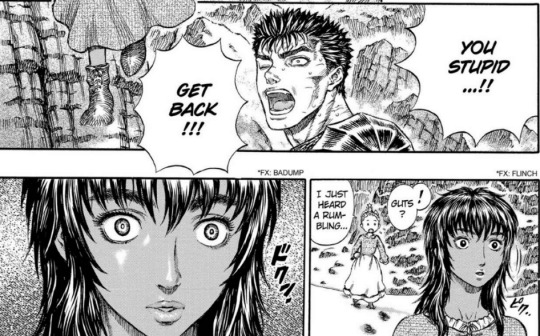
I’m not saying Guts is a terrible person for the things he says to Casca sometimes – I do think in this specific instance its how high his emotions are running and what’s going on at the time. But it’s just. Interesting isn’t it? Just the way he insults her kind of foreshadows how he treats her as a burden for... much of the rest of the series, really, but especially until Farnese and Serpico turn up again.

One day I’ll write a thing about my perception of this triangle between Guts, Griffith and Casca – which more or less comes down to “most of them have always been worried about losing the rest of them to each other,” with the sole exception being Griffith’s arguably not caring about losing Casca to Guts so much as he cared about losing Guts to Casca. But really the relationship between them begins with Casca being terrified to lose Griffith to Guts, and then Guts steps back and pushes Griffith and Casca together despite how he feels about it, and then of course during the rescue he worries about losing Casca to Griffith and then them to each other.
Now, what’s going on with this whole situation is kind of different but it also plays on that, because Guts doesn’t know that Griffith is carrying the remains of their son in his body so he interprets Casca’s reaction to Griffith as, well, her reaction to Griffith. Which, considering how that particular relationship ended, can’t be easy for him to see.


As evidenced by his anguished reaction to Casca reaching for Griffith’s face.
And now we proceed to some of the most important pages, I M O, mostly in terms of Guts’ reaction to Griffith because I just wish people would read more closely and look at the art when they’re interpreting things, but anyway woe is me, moving on.
So Griffith’s like, fuck worrying about this baby, I’m out of here. And Guts’ immediate reaction is...

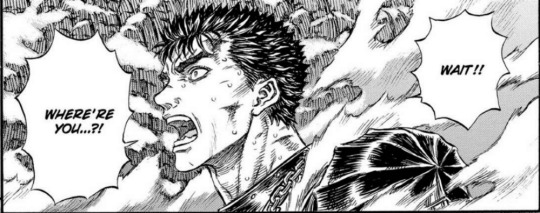
“W... wait! Where’re you...?!”
I mean look his immediate priority isn’t taking a shot at Griffith’s back, it’s not talking smack, and his face isn’t even angry, not even when Griffith first gives his reasoning:
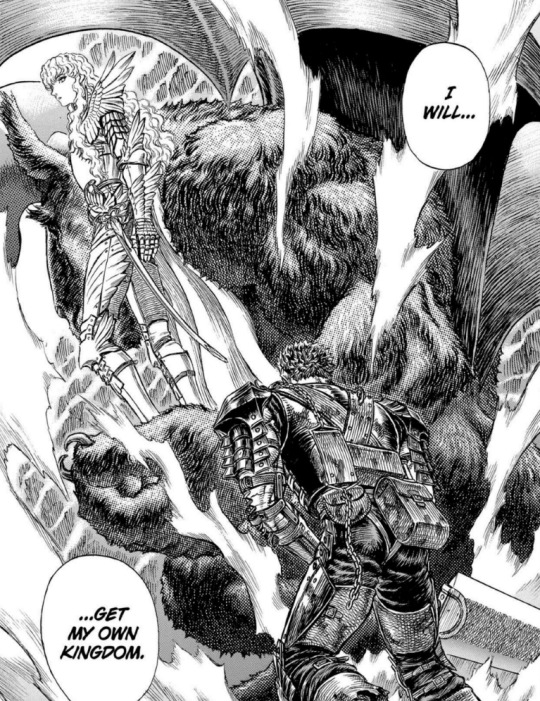
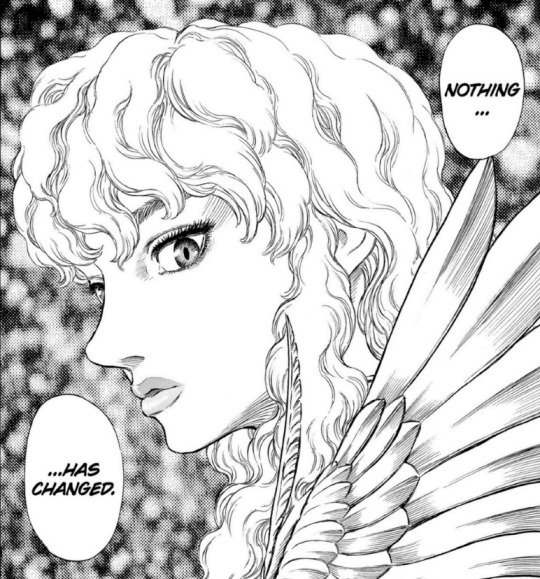
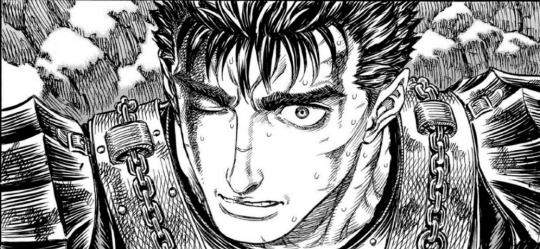
It’s... complicated.
I mean, again, I’m not saying he doesn’t want to beat on Griffith or kill Griffith, I’m aware that he does, just that there’s a lot more going on there and in this moment– in this moment - when he realizes that Griffith is leaving, he isn’t concerned with revenge. He just. Doesn’t want Griffith to leave. Which...


Consistency!
Because I think even at this moment, even now after Griffith said he didn’t care (well implied) and all of that, he still has a corner of him that wants to believe this can be the beginning of something instead of the end. Going back to the exes thing, it’s a situation where a guy (Guts) breaks up with his boyfriiend (Griffith) because he’s going to college and having “experiences,” but it causes a huge fight, but one day they decide go to lunch and catch up but they go into it with different intentions because the guy is kind of hoping they can work it out, but the boyfriend has already moved on with his life.
This becomes even more evident in a few pages but for now...

As noted, he doesn’t even acknowledge Rickert on panel until he’s finished dealing with Guts and is ready to get to the next thing.

And it’s only then – after Griffith decided to take off in the middle of their reunion and blew him off when he objected, that Guts finds his anger again.


And I’ve seen some people wonder why he extends this offer to Rickert but not to Guts. I think that’s a pretty easy one to cover, though. A few things.
First, Rickert isn’t a sacrifice. You can’t bring Guts around the apostles and Griffith’s supernatural mojo even if he were willing to go, he reads as food to them.
Second, Rickert wasn’t in the Eclipse. As such, there’s still a chance that he can deal and put it aside – and in fact Rickert didn’t really decide what to do until the last minute, so yeah there was presumably a chance that it could go the other way.
Third and arguably most importantly, Guts is incredibly dangerous to Griffith. He’s the Achilles’ Heel that took him down twice in the past. Even after his ascension he was unable to make himself hurt Guts. Now Griffith has come all this way to make sure he didn’t care anymore... and ended up realizing that for whatever reason, he does. There’s no way he’d invite that into his world even if there were a chance that Guts would accept, which there isn’t, which is the last thing.
Fourth, why waste his breath?
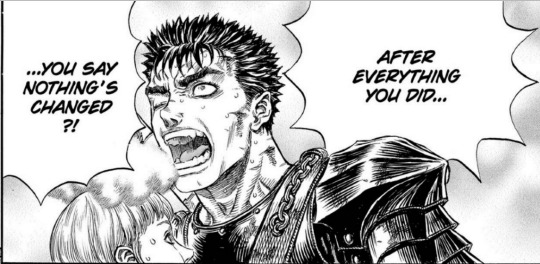
“Wait, Ariel, didn’t you just say you think Guts kind of wanted to make up with Griffith?” Yeah, and I meant that, but I think in order to bridge that gap, wide as it is, Guts needs things from Griffith that Griffith isn’t giving him - arguably isn’t even capable of giving him. Because unless Griffith could tell him he regrets it, that he made a mistake, and that he still cares about Guts himself, there’s no ground to gain there. And he won’t. So there isn’t.
It’s like a roller coaster with Guts and his feelings about Griffith – the anger comes and subsides and comes and subsides, largely dependent on what Griffith is doing.
I feel like here and also to a lesser but still significant degree in the meeting with Femto back in the Black Swordsman arc, Guts’ initial reaction to Griffith is... anger but almost like an anger that’s slightly hesitant – he’s easily discouraged in this case, he’s blocked by Rickert and all of that. And then he looks for something of the original Griffith – its like a hostile interrogation – look at you up there putting on godly airs, what do you mean you don’t feel anything, feel something, how can you say that, what do you mean I don’t matter?! And when that fails to provoke the response he wants and Griffith inevitably basically says go away insect, that’s when the real anger comes... mostly to swallow the pain.

I see a lot of people saying that this is Griffith admitting he was an evil monster the whole time and literally nothing about him has changed. I think that’s a bit of a stretch – he’s talking about how Guts is the only person who would know that he’s ruthless when he has to be, but of course when he did that around Guts in the past, he was visibly shaken by the need to do so and asked if it made him a terrible person.
My point is I don’t think he’s making a comment on his dearth of emotion as a human person – he’s just saying that even despite having done awful things, he isn’t going to stop. It doesn’t really matter whether he feels badly about it or not -- I don’t think he does, but it also doesn’t matter that he doesn’t feel guilty just like it didn’t matter that he did feel guilty in the past. Griffith is, and has always been, able to cut some throats and keep it pushing. And Guts – only Guts – would know that about him.
It’s a sort of similar situation to another thing people use to make that “Griffith was always a sociopath” argument – Rickert saying that NeoGriffith is “different, but somehow more Griffith than before.” As in “oh he masked off and revealed his evil and Rickert realizes that this demon guy is more of Griffith’s true self than he’d seen before” I guess. Which I think is s silly interpretation, but I guess we’ll get into that when it comes up. But, preview I guess, I think it’s clearly Rickert comparing NeoGriffith’s embodiment of the White Hawk image – the impression Griffith left (and attempted to leave) of a large than life aloof hero driven primarily by his dreams” – to human Griffith, who was those things but in a less “pure” form due to his human frailties, self-doubts and attachments.
But I also think his saying that, his claim that the current heart-poor version of him is the same as he always was, is part of the reason Guts is able to “let him go.” Because Guts does this thing where whenever he gets more information about Griffith he tries to integrate that information into his views, and it ends up changing everything about his perception of Griffith’s personality and his behavior. And you can literally see it happening on the page:

Originally, he was confused about why Griffith kept risking his own life for Guts, and Griffith said “I have no reason, it’s just for you” and Guts reworked his understanding of Griffith and their relationship in his head.

And then he heard Promrose, and he recontextualized everything again - suddenly he was wrong, they weren’t friends, he was just being stupid. This is where he develops this view that Griffith is “the boundless hawk,” who is “always taking” and "would never come down to the land where we crawl.” At this point he’s chasing Griffith the way his child self used to chase Gambino - I’m not saying Griffith’s his metaphorical father or anything, I’m saying Griffith becomes the hero that he wants to be seen, valued, and validated by.


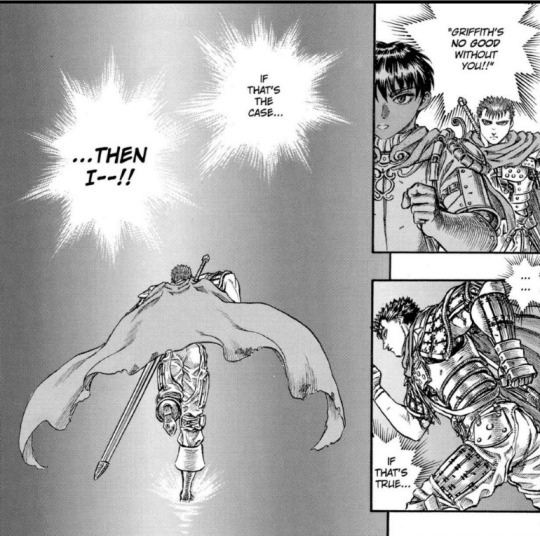
Then during the rescue he starts to understand Griffith again and begins to realize that Griffith wasn’t cruel, wasn’t cold. He wasn’t anything like Gambino, he really did care, and Guts was wrong about him the whole time. This is when he gets the closest to fully understanding Griffith’s motivations - to the point where just before the Eclipse actually occurs he is finally starting to see how much of Griffith’s... self rests in his hands - that maybe his absence is what caused Griffith’s fall. But then...
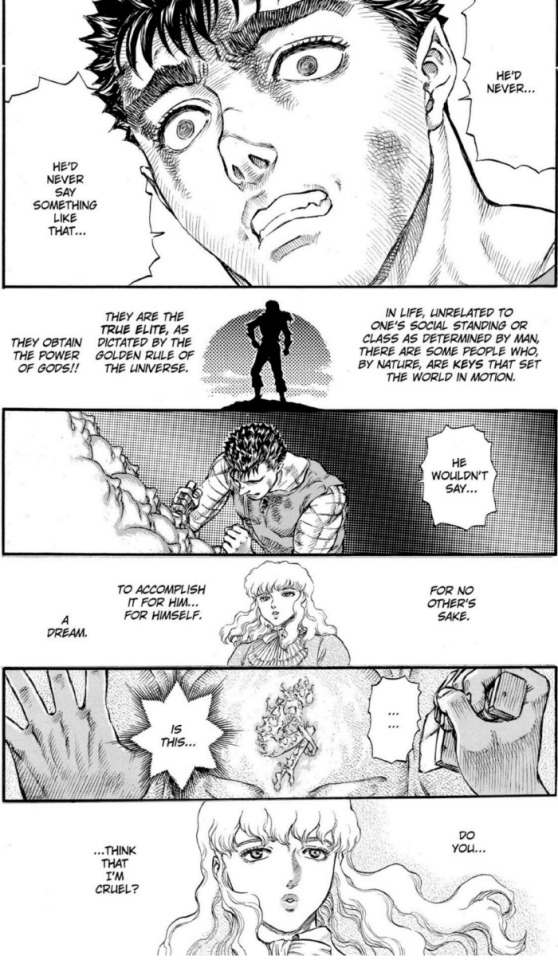
After the Sacrifice, Guts pulls a Berserk fan: he can’t understand how someone could care and still make this choice, and all the things that made him dazzling become evidence of his ability to be heartless.
That brings us here, because ever since the Eclipse, in both his meeting with Femto and this meeting with NeoGriffith, Guts searches for reasons to recontextualize his understanding again. He demands to know how Griffith feels, whether he cares, does he regret anything, how can he be so calm about this, how can he be so dismissive. It’s anger, but he’s also trying to understand so he knows what to think about both Femto/Griffith as he is now and about Griffith as he was, then.
The issue is that when Griffith says, “I dont care about you, I don’t care about them, I’m just going to go conquer things and no I don’t feel about about it,” and then follows that up with “You of all people should know is and has always been the way I am...”
Guts kind of gets his answer. And if he operates under the assumption that Griffith has always been this person - the person who could rape Casca just to hurt Guts, the person who could straightforwardly say he doesn't care about all the people he fed to demons - then honestly what is there to hold onto?
I mean, he’s wrong. Griffith obviously has been changed by the loss of his... softer pieces. I don’t want to keep calling it humanity because of all my ranting about Berserk’s humans recently, but you know what I mean. But even if he’s wrong, he isn’t aware of it, hey. And that facilitates his ability to kind of let go, at least to the degree that he does which is marginal anyway. And while it doesn’t really eliminate the ambivalence entirely, but it does let his emotional conflict settle a little.
tl;dr: he’s just being wrong again, but what else is new.
Anyway!
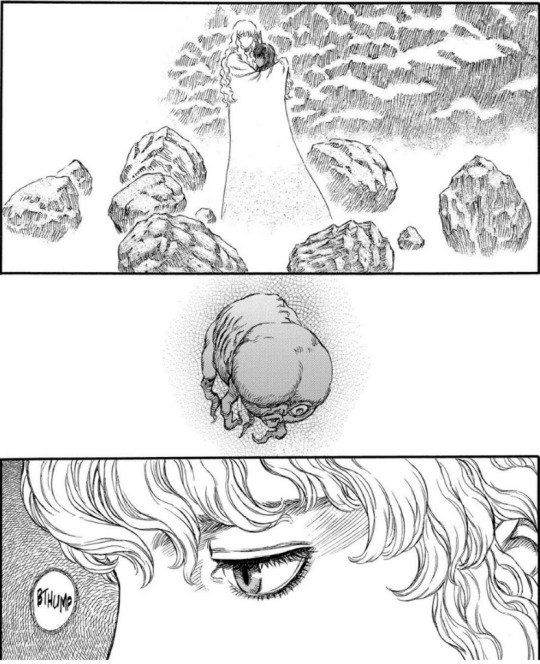
So now I’m going to take a moment to talk about what I didn’t talk about before, namely whether Griffith’s emotions derive from the infant.
I think they do, and also they don’t.
The thing is, way back before there were any demon babies, Femto had already failed to attack Skull Knight specifically because Guts would have gotten caught in the attack. And, given that when Guts asks him directly if he has zero feelings he doesn’t answer the question but rather evades it, I think it seems probable that Griffith does retain some emotion – it’s enough that, no matter how vague and distanced, it made him hesitate and thus saved Guts’ life. This is also, I think, the reason Femto is such a petty bitch around Guts – the guidebook even notes that Femto goes out of his way to do things to humiliate or hurt Guts, “perhaps due to the complicated feelings he harbored prior to reincarnation.”
That said, it does seem likely that Femto/Griffith’s emotions are extremely blunted – frozen so to speak – and that the child acts as an enhancer, or that its feelings mix in with his, or its impulses influence his actions, or all of the above. In that sense you could say the baby is the chain that holds him, but I don’t see how his own feelings could be completely void without a retcon which, I mean, maybe there’s a retcon, I have no idea.
Also people like to say the manga states directly that the feelings all come from the kid, but it’s Griffith that says it, and it’s not exactly unGriffithlike behavior to deny his own feelings or explain them away.
So right now smart money for me is on “Griffith has feelings but they are dulled and the infant catalyzes them and influences his behavior,” but I’m open.

Casca magically sensing her kid so fucking weird.
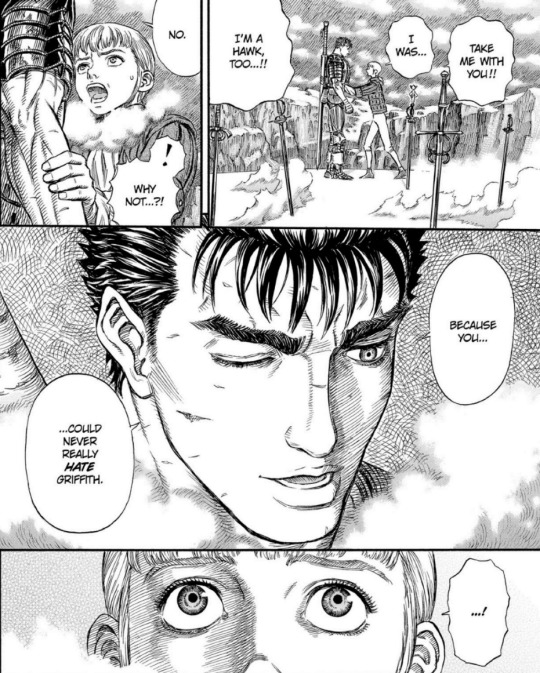
“I was... I’m a Hawk too.” I love that even after everything with Griffith, they really... still identify that same way. Even way in the future when Rickert confronts Griffith in Falconia, he doesn’t disavow the human leader he followed, only the demon that leader became. Guts’ reaction is a little more complicated, but even he conceptualized them as the Hawks with Casca as the leader and himself as the Raider Captain going to seek the enemy) when he first set out.
I love the footprints in the snow. I mean I realize Miura made it snowy because of the bit in a few pages and that obviously the snow would involve footprints, but ever since the snow duel, footprints in the snow have sort of represented paths and choices for me, at least when it comes to Berserk. In this moment, Rickert is kind of faced with the same decision Guts is dealing with – to go after revenge or to protect the girl. And Rickert is who he is, which is why he obviously struggled with it less than Guts does.

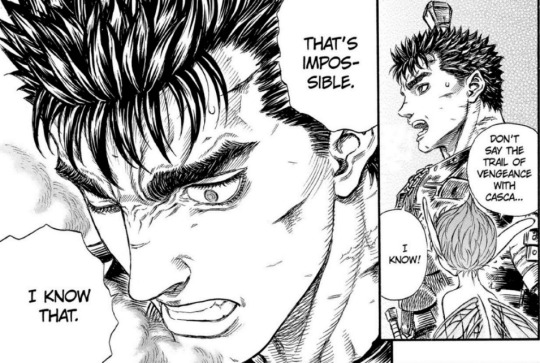
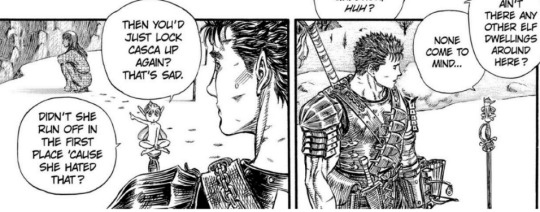
I really wonder what he would have done if Zodd didn’t collapse the cave.
Because even though he says he won’t leave her again, that’s what he said when he set off for the Tower to begin with, and then he was like yeah idk maybe I should ditch. Even now he’s thinking about other places he could drop her – other elf dwellings - and Puck even picks up that he’s considering just locking her up again.
Then... when they finally started for Elfhelm... he decided to focus on her and get her to safety, but he was obviously struggling with the desire to drop her off there and leave. People like to say he chose to protect her over pursuing vengeance, which he did but I do not think that was ever going to last and what’s more I don’t think he *really* intended it to. He was never going to like, settle down in Elfhelm with her. He may have considered it, he may have even told himself he would... but he wouldn’t. He couldn’t.
And I do think it’s evident that he knew that on some level.
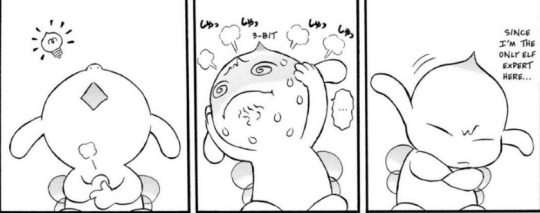
No point here, just lolz.
Okay we’re in the home stretch, this is a long rambles session, sorry about that.
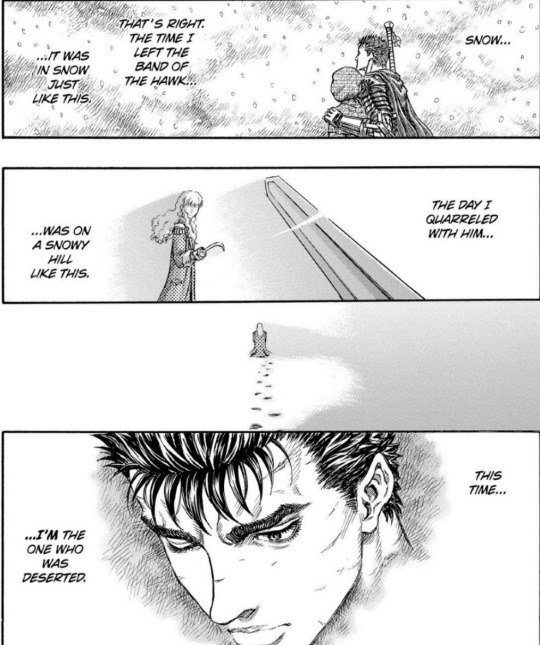
Wow look at all that simple and uncomplicated pure hatred.
But seriously, we come back around to what I was saying earlier – even though Guts hates him and wants to kill him, he also wants.... him back in his life?? I don’t know how else to put it. Guts feels dismissed and deserted. He abandoned Griffith and thus was abandoned in turn. You don’t describe yourself as abandoned/deserted by someone unless you feel their loss - but more than that, he explicitly draws a parallel between the way he abandoned Griffith, who desperately wanted him to stay (and engaged him in violence to that effect, for that matter), and now, when Griffith has abandoned him despite his vioiently desperate attempts to make him stay.
Also, in a minute I’ll explain this, but he views the loss of his friend as his own fault – a result of his own actions, his decision to walk away. Because again, there was a part of him hoping for a reconciliation. I will die on that snowy hill.
From there...
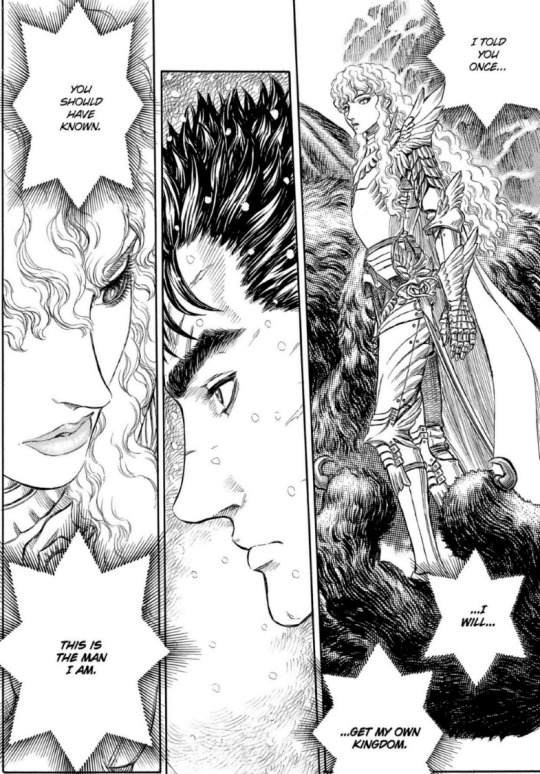
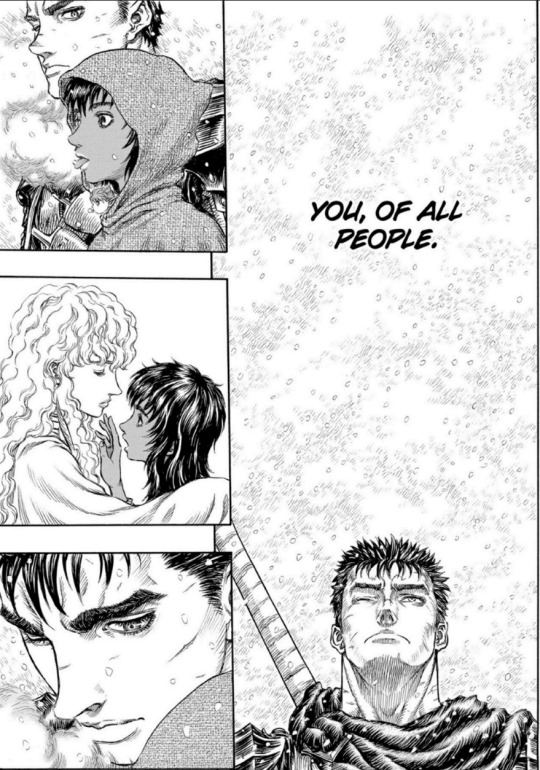
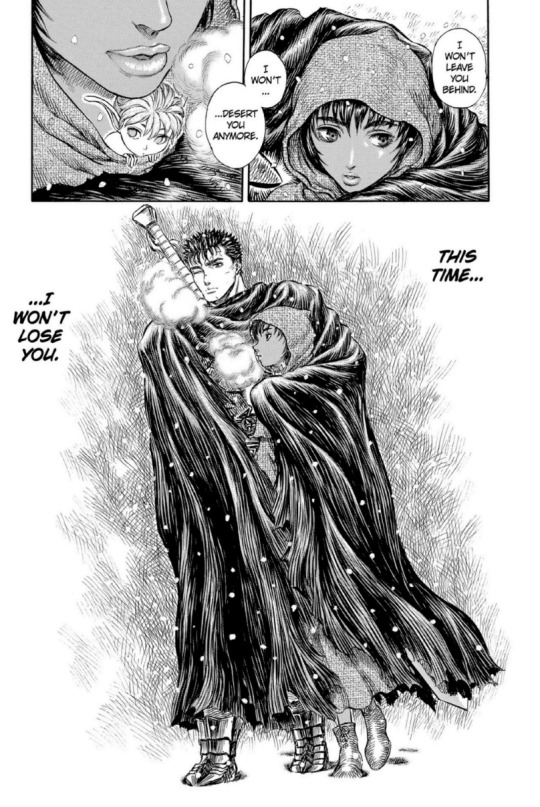
So I went back to the Japanese on this because sometimes the specifics of the Japanese phrasing clarifies what’s being said/done for me. As I always say, I’m not fluent in Japanese, I do my best, I’m not perfect, correct if necessary but...
What he says that’s translated a “I won’t lose you” is “I wont forfeit” with furigana that says “lose.” Also as is typical in Japanese it leaves out the pronouns but I do think that kind of changes the narrative just slightly, and no I’m not going to say he’s not talking about her, he’s obviously talking about her.
It’s just...
He’s thinking about the way he abandoned Griffith, which now leads to him being abandoned by Griffith, which leads to him kind of reflecting on that relationship - the distance that's between them, the destruction of that relationship that resulted from his having left Griffith behind. Then he looks at Casca and remembers her reaching for Griffith, which evokes that old fear of loss.
Which brings him back to how he'd abandoned her, too. And this is why I find the use of “forfeit” important – because forfeiting is to suffer a penalty as a result of a mistake or general wrongdoing or breaking of rules. And he’s using the same terminology for what he is not going to do to Casca... as he does for what Griffith has done to him.
So basically what I’m getting is that he perceives his relationship with Griffith as something he lost as a result of his having made a mistake/committed a wrongdoing and, recognizing that he almost did the same thing to Casca, he decides he isn’t going to repeat that mistake.
And I mean, again it’s about her, but not unlike the time he said he wouldn’t lose the flame and it was translated as him not wanting to lose Casca, it does kind of change the narrative in a negative way. Guts’s arc regarding personal relationships is that he goes from someone who values no one and is valued by no one to someone who is able to recognize that there are people he loves and needs, and people who love and need him. And his ability to face that and deal with the reality that his actions affect those people is what ultimately spurs him to change his behaviors.
-Guts leaves the Hawks, and as a result he loses Griffith AND the Hawks.
-He leaves Casca, and as a result when he comes back to Godo’s cave she’s run away and he nearly loses her.
-When he leaves to go get her, he doesn’t bother to look back at Godo, and when he gets back Godo has died.
It’s a repeating pattern - a series of actions that trigger losses that ultimately bring him to the point where he decides he can’t keep doing this or he’s going to end up with no one and nothing. And even though the outcome is the same: Guts decides he isn't going to throw Casca away because he won't lose any more people he loves, making it about losing her specifically makes it read as though he’s motivated by his romansu. And you can tell people read it that way because people who read it in english thinks he’s... motivated by his romance with her.
But that... misses the point of his journey and wastes the buildup of all those losses. It isn’t just about her. It’s about him and the way he treats people, and his growing understanding that he has to change.
Finally, before we go...

It’s kind of fascinating the way Griffith is still remembered as the savior of Midland – their guardian angel.

I guess this is a bit out of nowhere, but people’s hate for Sonia is so bizarre to me. If there’s anything I understand even less than disliking a character because they did something mean to a character I like, it’s disliking a character because they like a character I dislike. Sonia herself is just an innocent psychic teenager who can hear the whispers of the world.
I don’t know that I will ever have anything interesting to say about Silat, so...

I’ll leave you here.
...is that a magical horse? Inquiring minds want to know.
53 notes
·
View notes